
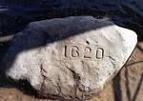

















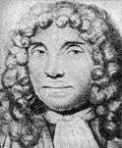

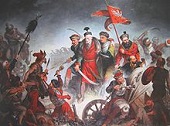
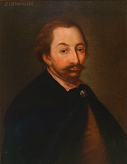



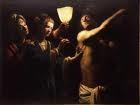
1620 Pop. of the Am. colonies: 2.3K. The pop. density in Germany is 35 per sq. mi., compared to 6 at the time of Julius Caesar, 160 in 1900, 280 in 1950. The Thirteen Drifty Days, a gigantic snowstorm destroys 90% of the sheep in S Scotland, incl. all 20K in Eksdale Moor. By this year the James River basin from the mouth of the Chesapeake River to within 20 mi. of modern-day Richmond has been settled under the sponsorship of the Virginia Co., which organizes itself into the Council for New England, intending to colonize it, but too bad the Pilgrims beat them to it before the king approves it?; tobacco-hating James I orders the culture of silk (sericulture) in Va., but it is given up by 1670 in favor of more profitable tobacco. As the Pilgrims arrive in Cape Cod in North Am. with a land grant from Charles I to the Plymouth Co. for "Northern Virginia", incl. Long Island, the Euro-induced plague of 1616-9 has greatly reduced the Indian pop. in the region; the closest Indians are the Massachusetts-speaking Pokanokets, head tribe of the Wampanoag Nation, led by sachem (chief) Massasoit ("supreme leader") (Owsamequen) (Woosamequen) (1581-1661), 60 mi. to the SW near modern-day Warren, R.I. (who had been reduced from 12K to 1K pop. and only a few hundred warriors), and the Algonguian Narragansetts to their W (who didn't get the plague, still having 25K pop., incl. 5K warriors), who had recently forced Massasoit to do obeisance to their sachem Canonicus (1565-1647); other tribes incl. the Massachusetts (Mahican) to the N and the Nausets (Cape Cod Indians) on Cape Cod, all of whom are Narrangansett enemies, and sachem-powwow Passaconaway (1565-1670) of the Algonquian Pennacooks (Pennacocks) (Merrimacks) to the N at the mouth of the Merrimack River; the 12K Indians of Cape Cod and surrounding islands in 40 villages (8K on the mainland, 4K on the islands) are later wamped together as the Wampanoags (Wopanaaka); the Pilgrims bring waffles with them after discovering them in Holland. On Feb. 4 a peace treaty is signed by Protestant anti-Hapsburg former prince of Transylvania (1613-29) Bethlen Gabor (Gabriel Bethlen) (1580-1629) and HRE Ferdinand II; on Aug. 25 Gabor becomes uncrowned king of Hungary (until Dec. 31, 1621). On May 16 the up-and-coming Earl of Buckingham marrries Lady Katherine Manners, 19th Baroness de Ros of Helmsley (-1649) over the objections of her daddy the 6th earl of Rutland, whom he pays off by granting him royal monopolies, which gets him into trouble with Parliament, causing him to flip-flop and play dumb; she becomes the duchess of Buckingham. On May 17 the first merry-go-round is observed at a fair in Philippapolis, Turkey. In the summer Thomas Dermer returns from Va. to Cape Cod, and finds the Pokanokets full of "inveterate malice to the English" after an English ship had arrived in Narragansett Bay in the spring and massacred a large number after first inviting them into their ship; after Squanto saves him at Nemasket (Plymouth), they go to Martha's Vineyard, where Epenow's men mortally wound him and take Squanto prisoner (his name comes from their god of death Tisquantum, pissing them off, because they are good Indians, worshiping the creator Kietan and familiar spirit Hobbamock, invoked by the shamans called powwows), then giving him to Massasoit at Pokanoket, just in time for the arrival of the you know what; Dermer dies a few weeks later in Va. - shall we say 7:30 at the old oak? On July 3 the German Catholic League (founded 1609) and the German Protestant Union (founded 1608) kiss and make up and sign the Treaty of Ulm, under the terms of which the Protestant Union declares neutrality and drops its support of Frederick V of Bohemia, stabbing him in the back and allowing the Catholic League to throw all its forces at him, starting by relocating to Upper Austria; meanwhile the truce between the Netherlands and Roman Catholic Spain ends (making the English Separatists in Holland who had not gone with the Pilgrims itchy?), and Spain sends troops to the Rhenish Palatinate, which is devastated by Count Tilly despite Maximilian I's treaty with the Protestant Union; England fails to help the Protestant League, although English volunteers join Frederick's army; Lower Austria submits to HRE Ferdinand II, and Bohemia is next on the list. White English America starts as a church relocation project to a hostile land where they aren't invited or wanted? On July 15 the 60-ton 50-ft. Speedwell, captained by double-agent "Mr. Reynolds" sails from Delfshaven, Holland (S of Leiden) with the Pilgrims (whose name comes from 1 Peter 2:11: "Beloved, I beseech you as pilgrims and exiles to abstain from the passions of the flesh that wage war against your soul") (they originally called themselves the Saints) after a teary display and prayer by pastor John Robinson (1576-1625) (who stays) that is talked about by the residents for years, stops in Dartmouth on Aug. 17 for repairs, gets stuck for days with low winds, then attempts an Atlantic voyage, but thanks to the jealous Dutch the capt. had installed large new masts which, when loaded with sail, make it leak, fooling the landlubbers and causing them to return and dock in Plymouth, where some give up and return to Leiden, while the rest transfer to the 90-ft. 180-ton Mayflower, a small merchant vessel (appraised value £1K) used in the English-French wine trade (cap. 180 casks or tuns); they leave at the wrong time of year, facing constant westerly gales; the 102 passengers incl. only 41 Puritan Separatists from Leiden, plus 61 "strangers" recruited and foisted on them unexpectedly by their financiers, the Co. of Merchant Adventurers, 70 Puritan-leaning investors from London, led by ironmonger Thomas Weston (1584-1647), who obtain a new patent for them for the "northern parts of Virginia" (at the mouth of the Hudson River), then sandbag them and change the terms at the last minute, making them work for them six days a week for the next seven years instead of only four, and appoint haughty "purchasing agent" Christopher Martin (1582-1621) to go with them as Mayflower gov. and run things; other strangers incl. troublemaker (murderer) John Billington (1580-1630), and Stephen Hopkins (1578-1644), who had been in the 1609 Bermuda shipwreck and narrowly escaped hanging for attempted mutiny by pleading for his life. On Aug. 7 the Battle of Le-Ponts-de-Ce (Ponts-de-Cé) sees Marie de' Medici's troops eeasily defeated by those of her son Louis XIII, ending the civil war in France, becoming known as the Le Ponts-de-Ce Joke; the French conflict with Savoy over Saluzzo remains unresolved until 1601. On Sept. 16 (Sept. 6 Old Style) the Mayflower sails from Plymouth, England, captained by dwarfish (less than 5 ft.?) red-haired soldier Myles (Miles) "Capt. Shrimp" Standish (1584-1656) (who takes his wife Rose along) (selected after the Pilgrims reject John Smith as too bossy and expensive) and mastered since 1609 by 50-y.-o. Christopher Jones (1570-1622) of Rotherhithe on the Thames River in C SE London, with 102 passengers and a crew of 27 incl. Capt. John Smith (1580-1631) (who had been captured by the Pacha of Nalbrits when fighting the Turks - first American encounter with a Muslim tyrant?), pilot and first mate John Clark (1575-1623), Robert Coppin (1590-?) (pilot and first mate?), barber-surgeon Giles Heale (-1653), and 21-y.-o. cooper (prime candidate for conversion and marriage?) John Alden (1599-1687); the True Blue Puritans from Leiden are led by elder and spiritual leader William Brewster (1568-1644) (returned from hiding), fustian (corduroy worker) William Bradford (1590-1657) (who coins the term Pilgrims, because they had been toughened up by their tribulations in England and weaned from England by their stay in Holland, hence can't be discouraged into going home again?), wealthy Pilgrim deacon (voyage organizer) John Carver (1576-1621) (along with his wife Katherine and five servants), Stephen Hopkins (1581-1644) (the only Mayflower passenger with prior New World experience, incl. bein shipwrecked in Bermuda in 1609 and serving several years in Jamestown Colony under Capt. John Smith) and his indentured servants Edward Leister (Liester) and Edward Doty (Doten) (1598-1655) (who get in Plymouth's first duel on June 18, 1621), the Winslow Family (direct ancestors of TLW?), brothers Gilbert Winslow (1600-1631) and Edward Winslow (1595-1655) (one of the 15 Pilgrims who brought servants or children, and one of eight who had the honorable distinction of Mister), and Edward's wife (since 1618) Elizabeth Barker Winslow (1595-1621), plus two dogs (a male spaniel and a mastiff bitch) seeking religious liberty yada yada yada; the ship carries three copies of the Geneva Bible, which they prefer to the state-backed King James Bible; during the voyage a sailor (who had been mocking them for seasickness and God gave him what's coming to him?) and young servant die, while everybody suffers from scurvy; three women are preggers, Elizabeth Hopkins (1585-1644) (who bears son Oceanus on the voyage), Susanna White (-1675) (who on Nov. 25 bears son Peregrine White (1620-1704) aboard the Mayflower in Provincetown Harbor, becoming the first English child born in New England, and after William White dies on Feb. 21, 1621 and Elizabeth Winslow dies on Mar. 24, 1621 she marries Edward Winslow on May 12, 1621, becoming the first bride in Plymouth), and Mary Allerton (1616-99), who has a stillborn son aboard the anchored Mayflower on Dec. 22, and dies in Plymouth on Nov. 28, 1699, becoming the last surviving Mayflower passenger; Edward Winslow's brother John Winslow (1597-1674) (TLW's ancestor?) arrives on Nov. 9, 1621 on the Fortune, and on Oct. 12, 1624 marries Mayflower passenger Mary Chilton; after ignorantly bucking the Gulf Stream the whole way, averaging 2 mph, and straying off course in a storm, they head S then encounter rough waters, and after "We could not now take time to further search or consideration, our victuals being much spent, especially our beer" (William Bradford) (they run out of beer after daily rations of 1 gal. each?) they head back N, and finally on Thur. Nov. 19 (Nov. 9 Old Style) after 65 days at sea arrive at the "back side" of fishhook-shaped Cape Cod (James), 220 mi. N of their intended destination at the mouth of the Hudson River, and set out S to reach it, but after attempting the treacherous Pollack Rip between the S end of the fishook and Nantucket Island they give up and return to Cape Cod in "the northern parts of Virginia". On Aug. 7 the mother of Johannes Kepler is arrested for witchcraft - putting the fear into him? On Aug. 8 there is a mysterious rain of frogs in Weil der Stadt. On Aug. 18 emperor (since July 19, 1572) Wanli (b. 1563) dies after the longest reign of a Ming emperor, and on Aug. 28 his eldest son Taichang ("grand prosperity") (Zhu Changluo) (1582-1620) becomes Ming emperor #14 of China; too bad, on Sept. 26 he dies of diarrhea, and on Oct. 1 his illiterate eldest son Tianqi ("heavenly opening") (Zhu Youxiao) (1605-27) becomes Ming emperor #15 of China (until Sept. 30, 1627), becoming a puppet and devoting his time to carpentry while eunuch Wei Zhongxian (1568-1627) (most powerful Chinese court eunuch in history?) and his nanny/wet nurse Madame Kei (-1627) take power, locking up the teen emperor's concubines and starving them to death; the Donglin Movement arises to protest the govt., along with several popular uprisings, causing Wei Zhongxian to order the torture and execution of Yang Lian, head of the Donglin Academy in Wuxi. On Sept. 17-Oct. 7 the Battle of Cecora (Tutora or Tsetsora Fields) near Tutora (Iasi) (Jasy) and the Prut Tiver in Moldavia sees a 20K to 60K-man Ottoman-Wallachian army under Iskender Pasha invade Poland and defeat and annihilate a game but smaller 9.6K-man army of Poles and Lithuanians under Stanislaw Zolkiewski (b. 1547), who is KIA. On Oct. 6 a group of anti-Roman Catholic rebels in Ethiopia are crushed by Emperor Susenyos' half-brother Sela Kristos at Mount Amendamit in Gojjan. On Nov. 3 Plymouth Colony is granted a Great Patent. The reason that Bohemians are Catholic? On Nov. 8 the Battle of White Mountain (Weissenberg) near Prague sees the Holy Roman Imperial army under Duke Tilly of Bavaria crush the Bohemian Revolt of the Czech Estates (begun 1619); Frederick V is deposed and flees to The Hague with his wife Elizabeth the Winter Queen, the leading rebels are executed, the Protestant clergy expelled, and Protestantism mercilessly extirpated; the lands of the native nobility are confiscated, and Bohemian independence ended, although Bohemia is saved from being absorbed by Germany; the twelve largest Roman Catholic cannons in Tully's army are named the Twelve Apostles; as Prague is liberated by the Roman Catholics, citizens who want to reveal their true colors kiss the soutanes of Jesuit chaplains; defeated Frederick V of Bohemia earns the epithet "Winter King" since he only lasted one year and four days and was gone with the melting snow, as the Hapsburgs had predicted, and is placed under the imperial ban; in the Thirty Years' War that follows, Catholics attain supremacy at the expense of the devastation of Bohemia; eventually all Bohemians are eventually forced to accept the Catholic faith or emigrate - no wonder they develop that who's minding the store attitude? The original one small step for a man, one giant leap for mankind? On Nov. 21 (Sat.) (Nov. 11 Old Style) the Pilgrims drop anchor on Long Point in sheltered Provincetown Harbor on the underside of the tip of the fishook (across Cape Cod Bay from Plymouth), where they stop because of the presence of freshwater streams even though Bradford calls it a "hideous and desolate wilderness" filled with sandhills; on Nov. 21 before disembarking (which they won't do on a Sun.), after the strangers begin grumbling that the religious kooks are getting them in trouble for settling outside the area of their patent, and the Puritans are worried that they need a civil covenant for governing the motley bunch that is not bound by their spiritual covenant, 41 Pilgrim Fathers (all male) (the rest are too sick?) sign the Bible-drenched Mayflower Compact, agreeing that "for the glory of God and advancement of the Christian faith and honor of our King and country... do these present solemnly and mutually in the presence of God and one of another, covenant and combine ourselves together into a civil body politick, for our better ordering and preservation... and by virtue hereof to enact, constitute and frame such just and equal laws... as shall be thought most meet and convenient for the general good of the colony, unto which we promise all due submission and obedience"; thus is layed the foundation for constitutional democracy in America with the first covenant-compact form of govt. since ancient Israel? (a mini-Declaration of Independence?); it is only meant to be temporary; John Carver is chosen as the first (1-year term) gov. of the colony; the first boat with 16 well-armed men lands and collects cedar wood, then returns to the ship to make their first fire in weeks; on Nov. 23 they disembark, and the men fix up their shallop (small boat), which had been disassembled for the voyage, while the women wash clothes in a pond, founding the tradition of Monday as Wash Day in New England; on Nov. 25-27 they make a land expedition of the tip of the fishhook, discovering Pilgrim Spring and Corn Hill (where they steal 36 ears of buried Indian Nauset seed corn, "Some yellow, and some red, and others mixed with blue"), and see their first Indians, 5-6 with a dog, who run), followed on Dec. 6-9 by a shallop expedition in Cold Harbor, discovering Pilgrim Lake, getting frozen feet (hence the name Cold Harbor), stumbling on the Indian grave of a blonde-haired Frenchman and child, then some Indian wigwams, which they loot, and on Dec. 7 finally getting attacked in Eastham by 30 Wampanoag in the First Encounter, who shoot yard-long arrows at them but retreat after being fired on without injuring anybody; on Dec. 16-22 they make a 3rd expedition W (clockwise) across the 65-mi. length of Cape Cod peninsula to the NW end, discovering Clark Island, named for pilot John Clark, and the site of Plymouth, where they don't mention any rock? On Nov. 25 Maria Eleonora of Brandenburg (1599-1655), most beautiful queen in Europe marries Gustavus Adolphus of Sweden, bearing Queen Christina in 1626. On Dec. 25 (Dec. 15 Old Style), after 1 mo. of searching for a livable location, 99 mainly sick and scurvy-ridden Old (First) Comers leave Provincetown Harbor, and on Dec. 26 enter Plymouth Harbor, anchoring at Goose Point at the end of Long Beach 1.5 mi. from the 200-ton granite Plymouth Rock at the end of Town Brook, then on Dec. 30 after more exploring found Plimoth (Plymouth) Plantation, the first permanent colony settled by WASP families, protected by 165-ft. Fort Hill, and all conveniently cleared of the 1K-2K Indian pop. by the plague, whose bleached skulls and bones are scattered around, along with who-knows-how-old "memory holes" on roads commemorating historical events; Chief Epenow of Martha's Vineyard assumes that the whites were sent from Virginia to avenge the attack on Thomas Dermer; William Bradford's wife Dorothy May Bradford and 3-y.-o. son John Bradford fall overboard on the moored Mayflower and drown (Puritan suicide?); Mary Chilton (1607-79) allegedly becomes the first female passenger to step ashore at Plymouth, jumping out of the boat and wading ashore onto Plymouth Rock in Thievish Harbor, and on Oct. 12, 1624 she marries Edward Winslow's 3rd brother John Winslow (1597-1674), who was on the ill-fated Speedwell and arrives on Nov. 3, 1621 on the Fortune; on Mon. Dec. 25 (Old Style) (Jan. 4, 1621) they erect the first house frame on Cole's Hill, the hill where they buried their dead the first winter; the Mayflower remains anchored in Plymouth Harbor until next Apr.; the more juicy Massachusetts Bay to the N (future home of Boston) waits for future Puritan squatters; only 72 years to the Salem Witch Trials; the Pilgrims learn the recipe for Boston baked beans from the natives, and add barley to cornbread to make New England brown bread; later after Boston begins exporting rum from the Triangular Trade, molasses are added to baked beans. On Dec. 25 (Old Style) (Jan. 4 New Style) the Pilgrims of the new Plymouth Colony show their contempt for Christmas by working all day. After French nobles stage the 1620 Nobles Revolt against Louis XIII, Cardinal Richelieu makes peace, reconciling Queen Mother Catherine de' Medici to him. The Roman Catholics of the Valtellina (Valtelline Pass) in N Italy (most important link between Hapsburg Austria and Spanish Hapsburg possessions in Italy), led by Rudolf von Planta rebel and massacre the Protestants of the Grisons League, allowing the Spanish to seize the pass, causing Bern and Zurich to send pastor Georg (Jurg) Jenatsch (1596-1639) with a Protestant force, and they score initial Vs in the Valtelline War (ends 1639), killing Rudolf's father Pompejus, which creates a grudge situation and later backfires. Sweden and Poland go to war, and Gustavus Adolphus occupies Livonia (modern Latvia-Estonia) on the Gulf of Riga. In this decade there is an indigenous indo revolt against the Spanish in the Kagayan Valley of the Philippines. Roman Catholic missionary Johann Adam Schall von Bell (1592-1666) comes to China. Patriarch Cyril Lucaris (1572-1638) of Alexandria becomes ecumenical patriarch of Constantinople. Currency inflation begins in Germany (ends 1623). About this year Manchester, England begins manufacturing cotton textiles, going on to become #1 in the world. The first regular shipment of indentured servants arrives in North Am. to work the tobacco plantations in Va.; commercial tobacco growing in England is banned in return for a 1 shilling per lb. duty on Va. tobacco; 40K lbs. are exported this year, and in 1670 Va. and Md. together ship 15M lbs.; in this decade Va. passes Blue Laws, with a penalty of 1 lb. of you guessed it. After the English are slow to adopt it, despite being used since Roman times, Charles I issues a proclamation requiring the bit to be used by cavalry horses instead of the snaffle, and permitting snaffles only for racing and hunting. Oliver Cromwell is denounced for participating in the "disreputable" game of cricket. Peter Paul Rubens is invited to France by Queen Mother Marie de' Medici to help her decorate the Palais du Luxembourg in Paris, and he is commissioned to paint 21 large works commemorating her marriage to snookems, er, Henry IV for 20K ducats. Italian traveler Pietro della Valle, who arrived in Persia in 1618 and was welcomed by Shah Abbas I sends the first known round face short muzzle Persian cats to Europe. Guadalcazar, Mexico is founded. The pro-Habsburg Flemish newspaper Nieuwe Tijdenghen begins pub. in Antwerp, becoming the first Flemish newspaper. The Freiburg Botanical Garden in Freiburg im Breisgau, Baden-Wurttemberg, Germany is founded by the U. of Freiburg. The Uppsala U. Library is founded by Gustavus Adolphus (Gustav II Adolf), becoming the largest univ. library in Sweden. Starting in this decade Southeast Asian spices and pepper meant for the old Muslim route to the Red Sea are blocked by the Dutch, which also stifles Muslim pilgrims attempting to reach the Middle East. The first English newspaper is pub. in Amsterdam - Pilgrims, Pilgrims, read all about it? Tobacco use is outlawed in Japan, but becomes a rage in Korea. The title of Baron Digby is created in Ireland for King's County gov. Robert Digby (-1642); their motto is "Deo, non-fortuna" ("By God, not fate"). Architecture: Notre-Dame-des-Anges Church is begun in Quebec City, Canada by the Recollect Friars Minor, becoming the oldest stone church in North Am.; in 1629 the Recollects are expelled by the British, and it is acquired by the Jesuits until 1670, when they return; in 1692 it is purchased by Jean-Baptiste de La Croix de Chevrieres (Chevrières) Saint-Vallier (1653-1727), bishop #2 of Quebec (1685-1727), who founds a hospital there. George Seton finishes the restoration of the Winton House in East Lothian, Scotland. Inventions: Cornelius (Cornelis) Drebbel (1572-1633) of Holland invents the first navigable (steerable) Submarine, based on a leather-covered wood frame for the British Navy, and later demonstrates it to Charles I - it's corny and it dribbles, but it's all mine? Science: Niccolo Cabeo (1586-1650) of Italy discovers that electrified bodies can attract non-electrified ones and that two electrified bodies repel each other. Cornelius Drebbel of Holland discovers scarlet Bow Dye; his daughter marries Johannes Sibertus Kuffler of Leyden, who sets up a dye house in Bow. Nonfiction: Johann Heinrich Alsted (1588-1638), Encyclopaedia Septem Tomis Distincta (7 vols.). Sir Francis Bacon (1561-1626), Instauratio Magna: Novum Organum Scientarum or a True Guide to the Interpretation of Nature; an attempted sequel to Aristotle's Organon, stressing the importance of experimentation in organizing knowledge. Gaspard Bauhin (1560-1624) Prodomus Theatri Botanici; describes approx. 6K plants. Jakob Boehme (1575-1624), The Threefold Life of Man; Answers to Forty Questions Concerning the Soul; The Treatise of the Incarnations; The Great Six Points; Of the Earthly and the Heavenly Ministry; Of the Last Times, the Resurrection, and the Fall of the House of Babel. Juan Pablo Bonet (1573-1633), The Art to Teach Dumb People to Speak; Spanish manual on sign language, which he teaches to deaf children in the Spanish court; first book on deaf education. Johannes Buxtorf (1564-1629), Tiberias, sive Commentarius Masoreticus; disputes the late origin of Hebrew vowel points; too bad, he dies before he can finish the argument with Louis Cappel, causing his son JB Jr. to take over. Tommaso Campanella (1568-1639), De Sensu Rerum et Magia. Thomas Campion (1567-1620), A New Way of Making Fowre Parts in Counterpoint. Edmund Gunter (1581-1626), Canon Triangulorum, or Table of Artificial Sines and Tangents; treatise on logarithms. Giovanni Antonio Magini (1555-1617), Atlante Geografico d'Italia (Geographic Atlas of Italy) (posth.); dedicated to his patron Duke Vincenzo I Gonzaga of Mantua (1562-1612). John Mason (1586-1635), A Briefe Discourse of the New-Found-Land. John Webster (1580-1635), The Devil's Law Case; contains the legend that Elizabeth I gave the Earl of Essex a gold ring with a sardonyx cameo of her, telling him to send it to her when he is in trouble and she will help him; while in the tower Essex gives it to a boy through the window, telling him to take it to Lady Scrope, who would give it to the queen, but by mistake he gives it to her sister the Countess of Nottingham, who is the wife of Essex's rival, and she keeps the ring; on the queen's deathbed in 1603, she tells her about it, to which the queen replies "May God forgive you, Madam, but I never can." Art: Trophime Bigot (1579-1650), St. Sebastian Cared for by St. Irene (1620-30). Jacques Callot (1592-1635), The Fair at Impruneta (print). Anthony van Dyck (1599-1641), St. Sebastian. Jacob Jordaens (1593-1678), Passage to Antwerp. Guido Reni (1575-1642), Abduction of Deianira (1620-1). Peter Paul Rubens (1577-1640), Chapeau de Paille. Adam Willaerts (1577-1644), Departure of the Pilgrims from Delfshaven. Music: Claudio Monteverdi (1567-1643), Seventh Book of Madrigals. Plays: Lope de Vega (1562-1635), The King's the Best Magistrate (1620-3); The Knight from Olmedo (1620-5). Births: Croatian-Hungarian poet-soldier-statesman and nat. hero Miklos (Nikola) (Nicholas) Zrinyi (Zrinski) (d. 1664) on Jan. 5 in Csaktornya. German-Dutch field marshal prince Georg Friedrich of Waldeck (d. 1692) on Jan. 31 in Arolsen. Dutch physician Paul Barbette (d. 1666) in Strasbourg; educated at Leiden U. Prussian duke (1640-88) and Brandenburg elector (1640-88) (Calvinist) Frederick William (Friedrich Wilhelm) (the Great Elector) (d. 1688) on Feb. 16 in Berlin; son of elector George William and Elizabeth Charlotte of the Palatinate. Swiss philologist-theologian Johann Heinrich Hottinger (d. 1667) on Mar. 10 in Geneva; father of Johann Jakob Hottinger (1652-1735); grandfather of Johann Heinrich Hottinger (1681-1750). English soldier-historian-politician ("the Cavalier Colonel") Sir Winston Churchill (d. 1688) on Apr. 18; father of John Churchill, 1st duke of Marlborough (1650-1722); ancestor of PM Sir Winston Churchill (1874-1965); educated at St. John's College, Oxford U.; knighted in 1664. French mathematician-astronomer Jean Picard (d. 1682) on July 21 - the original Star Trek Capt. Jean-Luc Picard? French "A New Division of the Earth" physician-traveller Francois Bernier (d. 1688) on Sept. 25 in Joue-Etiau, Anjou; educated at the College de Clermont; secy. of Pierre Gassendi (1592-1655). French painter-sculptor-architect-engineer Pierre Paul Puget (d. 1694) on Oct. 16 in Marseille. Dutch landscape painter Aelbert Jacobsz Cuyp (d. 1691) on Oct. 20 in Dordrecht; son of Jacob Gerritz Cuyp (1594-1652). English gardening writer John Evelyn (d. 1706) on Oct. 31 in Wotton, Surrey; grows up in Lewes, Sussex. French courtesan-writer Anne "Ninon" de l'Enclos (d. 1705) on Nov. 10 in Paris; patron of Moliere and Voltaire; lover of the Great Conde and duc de La Rochefoucauld; Cardinal Richelieu offers her 50K crowns for one night. French royal favorite (of Louis XIII) Henri Coiffier de Ruze (Ruzé), Marquis de Cinq-Mars (d. 1642); father Marshal Antoine Coiffier-Ruze, Marquis d'Effiat, suptd. of finances dies in 1632, causing his friend the Cardinal ffRichelieu to take him under his protection. English witchhunter Matthew Hopkins (d. 1647) in Great Wenham, Suffolk; Puritan clergyman father; collaborator of John Stearne (1610-70). English Brouncker's Formula mathematician William Brouncker, 2nd Viscount Brouncker (d. 1684) in Castlelyons, County Cork, Ireland; educated at Oxford U.; pres. #1 of the Royal Society. French physicist-priest Edme Mariotte (d. 1684) in Til-Chatel. English Puritan divine Thomas Watson (d. 1686); educated at Emmanuel College, Cambridge U. German-English Mercator Series mathematician Nicholas (Nikolaus) Mercator (Kauffmann) (d. 1687); coiner of the term "natural logarithm". Dutch still life artist Abraham Hendriksz van Beyeren (d. 1690) in The Hague. French scientist-diplomat-traveler Melchisedec Thevenot (Melchisédic Thévenot) (d. 1692); inventor of the spirit level, and popularizer of the breaststroke; uncle of Jean de Thevenot (1633-67). Hungarian "Muranyi Venus" poet Istvan Gyongyosi (István Gyöngyösi) (d. 1704) in Rozsnyobanya. Deaths: Jewish mystic Hayim Vital (b. 1542) on Apr. 23 in Damascus. Polish gen. Stanislaw Zolkiewski (b. 1547) near Iasi (KIA in the Battle of Cecora). Dutch mathematician Simon Stevin (b. 1548) in Leiden (The Hague)?. Chinese Ming emperor #13 (1572-1620) Wanli (b. 1563) on Aug. 18. English navigator William Adams (b. 1564) on May 16 in Hirado, Kyushu, Japan. English adventurer Sir Thomas Shirley (b. 1564). English poet-musician-critic Thomas Campion (b. 1567). English poet Richard Barnfield (b. 1574) in Mar in Dorlestone Hall; really his father, and he died in late 1590s London? Italian painter Carlo Saraceni (b. 1579) on June 16 in Venice. Chinese Ming emperor #14 (1620) Taichang (b. 1582) on Sept. 26 in Beijing (diarrhea).



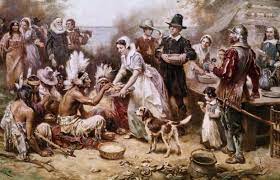












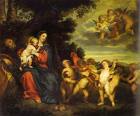


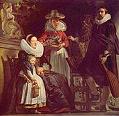
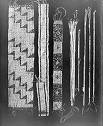
1621 On Jan. 28 Pope (since 1605) Paul V (b. 1550) dies, and on Feb. 9 Alessandro (Alexander) Ludivisi is elected Pope (#234) Gregory XV (1554-1623) (until July 8, 1623); Jesuit Cardinal Robert Bellarmine (b. 1542) (who coulda been pope?) dies on Sept. 17. In Feb. after spending several mo. in London studying the colllections of Italian Renaissance masters of the earl of Arundel and duke of Buckingham, Flemish painter Anthony van Dyck leaves for Amsterdam, then 8 mo. later heads for Italy, where studies the Venetian masters Titan et al., returning to Antwerp in 1627. On Mar. 26 (Mar. 16 Old Style) (Fri.) tall naked Wampanoag spokesman Samoset (1590-1653) (his English-given name of Somerset?), a sachem from Pemaquid Point in Maine near Monhegan Island (who learned English from English fishermen) unexpectedly visits the winter-decimated Pilgrims (52 of 102 dead, incl. Mayflower gov. Christopher Martin in Jan., causing the survivors to conceal the corpses in secret graves to fool the Indians), and walks right up to their homes, and when stopped issues the famous soundbyte "Welcome, Englishmen!"; he tells them how their harbor's name is Patuxet and had been inhabited then wiped out by plague, and that another Indian, the once-kidnapped and well-traveled local Patuxet Squanto (Tisquantum) (1585-1622), who had been in Spain, Newfoundland, and London, and can speak better English is with chief Massasoit in Pokanoket 40 mi. SW, and stays overnight with a half freaked-out English family; on Apr. 1 (Mar. 22 Old Style) after his powwows try in vain to make the English devils disappear with a 3-day swamp meeting, and cagey Squanto tells him the English have a secret WMD of plague and shouldn't be messed with but rather cultivated to help him fight the Narragansetts, bear-greased dark red-faced Massasoit and his son Quadequina visit Plymouth Colony with 60 intimidating warriors, and after being greeted outside the town on a hill by sole rep. Edward Winslow (1595-1655), who tells him that King James of England greets him "with words of love and peace", and trying in vain to make a trade for his sword and armor, he agrees to meet Gov. John Carter, with Winslow held as hostage and Squanto acting as interpreter, and after being served vodka which, combined with Squanto telling him that barrels of gunpowder in a storehouse actually contain plague, makes him sweat and tremble, the duped "Indian King" signs a 6-point peace treaty, which lasts 50 years, with Winslow acting as the colony's initial rep. as well as being 2nd in command; the Indians use wampum ("white shell beads") (tubular shell beads made from the purple spot in quahog clamshells and white channeled whelk shells) for sacred ceremonies as well as for recording stories, but the English soon turn it into money. On Apr. 15 (Apr. 5 Old Style) with their numbers down to 52 but stabilized, the Mayflower sails for England (18 sailors dead), with cooper John Alden staying in Plymouth; on Apr. 18 Gov. John Carver (b. 1576) dies after lapsing into a coma on a hot day in the fields, and after the colony's first state funeral they elect William Bradford as gov. #2 (reelected 30 times until 1656), but since he's sick they appoint Puritan widower Isaac Allerton (1583-1659) (ancestor of U.S. presidents Zachary Taylor and FDR) as his asst.; on May 16 the Mayflower arrives in Rotherhithe after making use of westerlies, then sails for France with a cargo of salt, after which master Christopher Jones dies on Mar. 15, 1622 in England, causing the ship to lay idle for 2 years and then be broken up for scrap in 1624 after being appraised at £128. On Mar. 31 Spanish king (since Sept. 13, 1598) Philip III the Pious (b. 1578) dies in Madrid, and his son Philip (Felipe) IV (1605-65) succeeds him as king of Spain, Naples, Sicily, and Netherlands (until Sept. 17, 1665), becoming as weak a king as his daddy, soon appointing Gaspar de Guzman y Pimentel, Count of Olivares and Duke of Sanlucar (1587-1645) as Spain's first PM, relinquishing rule to him; Olivar goes on to reform the court and reverse the no-war policy of Spain, which is too late to stop Spain's decline; meanwhile carefree Philip becomes a patron of the arts, backing painter Diego Velazquez (1599-1660), dramatist Lope de Vega (1562-1635), poet Pedro Calderon de la Barca (1600-81) et al. in a desperate attempt to keep up with the heretic English? On Apr. 21 Elizabeth Sawyer, "the Witch of Edmonton" is executed in England, her guilt proved by having a "thing like a teat the bigness of the little finger, which was branched at the top like a teat, and seemed as though one had sucked it." On May 22 (May 12 Old Style) Edward Winslow (whose wife Elizabeth died on Apr. 3, two days after the big meeting with Massasoit) and Susanna White whose husband William died on Mar. 3) become the first couple in Plymouth Colony to marry, and claiming that the Gospels nowhere say a minister should conduct a wedding, they copy Dutch custom and have a civil wedding, starting a tradition - so Winslow is the whitest name you can get in America? On June 3 (worried about them pesky English?) the Dutch West India Co. is chartered for the New Netherlands (Netherland) to share world trade with the Dutch East India Co. by Peter Minuit's Antwerp friend Willem Usselincx (1567-1647), who prefers colonization of the New World to profit, and gives up after the Dutch estates-gen. don't support him; the co. later acquires a monopoly in Africa the North Am. coast from Newfoundland to Chesapeake Bay; in 1645 not-so-useless Usselincx utters the Immortal New York, New York Soundbyte: "It is because of foreigners that the country will be peopled, because its might is derived mostly from those who come from abroad and settle, marry and multiply here. If one were to remove the foreigners, their children and grandchildren from the large cities of Holland, the remaining residents would be fewer in number than those removed" - never mind those English squatters? On July 2 Edward Winslow and Stephen Hopkins make the Pilgrims' first diplomatic visit to Massasoit's home at Pokanoket (near modern-day Warren, R.I.). In mid-Oct. after with the help of good weather and the know-how of indispensible native Patuxet Squanto (Tisquantum) (1585-1622) (the first American Iron Chef in survival techniques?) (who first wows them by showing them how to dig up his trademark eels in shore mud, then how to use herring as fertilizer, and plant beans and squash with the corn to act as shade and prevent weeds) the Plymouth Colony brings in a bumper crop of veggies, lumber, and furs, it celebrates its first 3-day Thanksgiving along with Chief Massasoit and 90 warriors, who aren't invited but hear gunfire in connection with the feast, show up to see what's up, and end up becoming their niggers, supplying them with five deer, wild turkey, fish, beans, squash, corn soup, cornbread, and berries to go with their venison, duck, goose, lobster, mussels, grapes and plums?; they don't sit at tables but squat in front of fires?; the Pilgrims say the prayer from Psalm 107 (AKA Birkat Ha-Gomel) after a book by English scholar Henry Ainsworth uses Jewish scholar Moses Maimonides to show its applicability; on Nov. 9 (3 weeks later) the ship Fortune, under master Thomas Barton arrives with 35 new colonists, incl. Thomas Prence (1599-1673), throwing them back into danger of starvation; on the way home it loses its cargo of furs and timber to a French privateer; meanwhile the colony gets a land patent from the Council for New England; after John Carver's wife dies five weeks after him, their servant John Howland (1592-1672) (who fell overboard on the way, and held on until rescued) inherits some of the estate and goes on to become one of Plymouth's leading citizens; at the first big Nothanksgiving the Pequots of Cape Cod offer the white settlers a local fruit that grows in acidic bogs which they call "i-bimi" (bitter fruit) and use to make pemmican; the Pilgrims groove on it and name it for the cranes which like to eat it, calling it the craneberry (cranberry) (bounceberry because it bounces when ripe), making sauces and tarts from it - good love? On Dec. 6 Johannes Kepler observes his first predicted transit of Venus; Pierre Gassendi observes another on Nov. 7. The Huguenots rebel against Louis XIII (ends 1622). The Austrians expel the Swiss Protestants from the Valtellina; meanwhile the Swiss Confederation is paralyzed by the division between the Catholic and Protestant cantons, and sits it out all the way until 1639. The 12-year truce between Holland and Spain ends, and war resumes. Elector Palatine Frederick V is placed under the ban of the Holy Roman Empire, and the war moves from Bohemia to the Palatinate; German soldier Count Ernst von Mansfeld (b. 1580), who helped the revolting Bohemians in 1618 then had his butt kicked in Zablat in summer of 1619, causing him to offer his services to HRE Ferdinand II is appointed cmdr. of his army in Bohemia, and takes on Count Tilly in the Upper and Rhenish Palatinate, relieving Frankenthal and capturing Hagenau. Sir Francis Bacon is charged by Parliament with corruption, is fined £40K, imprisoned, and declared incapable of holding office; luckily, he is pardoned by the king after spending only a few days in the Tower, and allowed to keep his titles, devoting himself to study and writing; Bishop John Williams of Lincoln becomes Lord Keeper, and Lionel Cranfield becomes Lord Treasurer. Sir Francis Wyatt arrives as the new gov. of the Va. Colony with new regs, including a council of state and elected assembly. Bishop William Laud uses George Abbott's accidental shooting of a gamewarden to call for his removal as archbishop of Canterbury; James I exercises the deciding vote in his favor to save him. The Tamblot Uprising (Revolt) in the Philippines against the Spanish over religion begins, led by native priest Tamblot from Bohol. Dutch East Indies gov.-gen. Jan Pieterszoon Coen invades Banda to force them to sell their nutmeg and mace to them exclusively at low prices, capturing Lonthor Island after they use some cannons against him given to them by the english, pissing him off, after which he massacres or exiles most of the pop. English surveyor William Claiborne (1600-77) (b. 1587?) arrives in Jamestown, Va., and goes on to become a leader, "the foremost genius of early Virginia". The first duel fought in America takes place in Plymouth, Mass., and is fought with swords. Welsh-born British vice-adm. Sir Robert Mansell (Maunsell) (Mansfield) (1573-1656) (an investor in the Plymouth Co.) leads an expedition against the pesky Moorish Corsairs of the Barbary coast (Algiers, Tunis, Tripoli). The English attempt to colonize Newfoundland and Nova Scotia, with poet-courtier Sir William Alexander, Earl of Stirling (1567-1640) receiving a huge land grant from James I, which is later confirmed by Charles I; too bad, after a war with France in 1627-9, the 1629 Treaty of Susa (Suza) between France and the duchy of Savoy cedes the territory to France in 1632, leaving Alexander deeply in debt, although he is created viscount of Stirling and Lord Alexander of Tullibody in 1630 as a sop. The U. of Strasbourg in Alsace, France is founded from a Lutheran humanist gymnasium founded in 1538 by Johannes Sturm, becoming a royal univ. in 1631, going on to become France's largest univ.; alumni incl. Johann Wolfgang von Goethe; in 1872 it is refounded as the German Kaiser Wilhelm Universitat. Peter Paul Rubens (1577-1640), known as "the prince of painters and the painter of princes" is hired as a confidential agent by Spain to seek peace with Flanders and the Dutch Repub. Pietro della Valle's Syrian princess Maani dies, so he has her stuffed and takes her with him. Samuel Champlain's companion Etienne Brule (Brulé) (1592-1633) searches for copper mines described by the Indians, and reaches the W shores of Lake Superior and Lake Erie? Goteborg, Sweden (modern pop. 500K) is founded Gustavus II Adolphus S of 2,150 sq. mi. Lake Vaner (Väner) (Vanern) (Vänern). Potatoes are planted for the first time in Germany. The Fortune Theatre in London burns down. English historian William Camden (1551-1623) endows the Camden Chair of Ancient History at Oxford U. (first chair of history in the world) before being struck with paralysis and dying on Nov. 9, 1623 in his home at Chiselehurst, Kent (SE London); in 1877 the chair is attached to Brasenose College; in 1910 it is limited to Roman history. The Corante, or Newes from Italy, Germany, Hungarie, Spaine, and France begins pub. in London, becoming England's first newspaper. Inventions: In 1621-2 William Oughtred (1574-1660) of England invents the logarithmic scale along with the slide rule, which does multiplication and division by adding and subtracting logarithms - did it hurt? Science: Dutch mathematician Willebrord Snell (Snellius) (Willebrord Snel van Royen or Roigen or Roijen) (1580-1626) discovers Snell's Law of Refraction, a sine ratio called the refractive index between the angles of incidence and refraction of light entering a block of glass; too bad, he doesn't pub. it, and it takes until 1703 for Huygen to pub. his results in his "Dioptrica". Italian traveler Pietro della Valle (1586-1682) visits Iran and views the 6th cent. B.C.E. Behistun Rock, copying some of the cuneiform signs for study. Nonfiction: Jakob Boehme (1575-1624), De Signatura Rerum; A Treatise of the Four Complexions. Robert Burton (1577-1640), The Anatomy of Melancholy; pub. under alias Democritus Junior; quotes works by Jewish physician Isaac Israeli (855-955); "I write of melancholy, by being busy to avoid melancholy. There is no greater cause of melancholy than idleness, no better cure than business"; "The only book that ever took me out of bed two hours sooner than I wished to rise" (Samuel Johnson). Sir Henry Fitch (-1625), The World's Great Restauration, or Calling of the Jews, and with them of all Nations and Kingdoms of the Earth to the Faith of Christ; claims that the Jews will be restored to the Holy Land, then establish a worldwide empire after accepting Christ, getting him in trouble with James I (for threatening his divine right to rule England?), who has him arrested in Apr. 1621 until he disavows his work. Johannes Baptista van Helmont (1579-1644), De Magnetica Vulnerum Curatione; gets him in trouble with the Church for questioning miracles. Thomas Munn (1571-1641), A Discourse of Trade from England unto the East Indies. Art: Anthony van Dyck (1599-1641), The Rest on the Flight to Egypt; Susanna and the Elders (1621-2). Jacob Jordaens (1593-1678), Self-Portrait with Wife and Daughter Elizabeth (1621-2). Music: Johann Hermann Schein (1586-1630), Musica Boscareccia. Plays: John Fletcher (1579-1625), The Wild Goose Chase (comedy); pub. in 1652. John Ford (1586-1640), Thomas Dekker (1573-1632), and William Rowley (1585-1642), The Witch of Edmonton. Poetry: Daniel Heinsius (1580-1655), De Contemptu Mortis (On the Contempt of Death). Theophile de Viau (1590-1626), Poemes (1621-4); on the theme of Nature. Novels: John Barclay (1582-1621), Argenis (novel) (Paris). Lady Mary Wroth (1587-1653), The Countess of Montgomery's Urania; first prose romance by an English woman; the idea of a woman pub. a novel pisses-off men because they must remain silent to prove they're chaste? Births: English "Flecnoe" poet-satirist Andrew Marvell (d. 1678) on Mar. 31 in Winestead, Hopderness, Yorkshire; educated at Cambridge U. Welsh "Silex Scintillans" mystic poet ("the Silurist") Henry Vaughan (d. 1695) on Apr. 17 in Newton St. Bridget (near Scethrog by Usk), Brecknockshire. Irish soldier-politician-dramatist Roger Boyle, 1st Earl of Orrery (d. 1679) (AKA Lord Broghill) on Apr. 25; 3rd son of Robert Boyle, 1st earl of Cork and 2nd wife Catherine Fenton; educated at Trinity College, Dublin, and Gray's Inn. Dutch painter Isaac Jansz van Ostade (d. 1649) on June 2 in Haarlem; brother of Adriaen van Ostade (1610-85); father is from Ostade near Eindhoven. French poet-fabulist Jean de La Fontaine (d. 1695) on June 8 in Chateau-Thierry, Champagne. Dutch adm. Willem van der Zaan (Zaen) (d. 1669) on June 29 in Amsterdam; brother of Huybrecht van der Zaan; father of Willem van der Zaan the Younger. French military leader Louis II of Bourbon, Duc d'Enghien, Prince de Conde (Condé) (The Great Conde) (d. 1686) on Sept. 8 in Paris; son of Henry II, Prince de Conde (2nd cousin of Louis XIII) and Charlotte de Montmorency. English physician ("Father of Clinical Neuroscience") Thomas Willis (d. 1675) on Jan. 27 in Great Bedwin, Wiltshire; educated at Christ Church, Oxford U. Dutch painter Jan Baptist Weenix (d. 1660) in Amsterdam; father of Jan Weenix (1640-1719); introduces the Italian harbor scene into Dutch art. English N.Y. colonial gov. #2 (1668-73) Francis Lovelace (pr. like loveless) (d. 1675) in Kent; brother of Richard Lovelace (1617-57). Swiss engraver Matthaus Merian the Younger (d. 1687) in Basel; son of Matthaus Merian the Elder (1593-1650). Swedish field marshal Count Rutger von Ascheberg (d. 1693). English poet Henry Vaughan (d. 1695). French chemist Claude Bourdelin (d. 1699). Deaths: English lord Edward Seymour, 1st earl of Hertford (b. 1539). Italian "Galileo's Heah cum de judge" Cardinal Robert(o) Bellarmine (b. 1564) on Sept. 17 in Rome - move your ideas forward with RICO dependability? German Lutheran pietism founder Johann Arndt (b. 1555) in Celle, Hanover. Netherlands Hapsburg gov. (1598-1621) archduke Albert VII (b. 1559) on July 13 in Brussels. English explorer Thomas Harriot (b. 1560) on July 2 in London. English poet Mary Sidney Herbert (b. 1561) in London (smallpox). Italian poet Ottavio Rinuccini (b. 1562) on Mar. 28 in Florence. Dutch organist-composer Jan Pieterszoon Sweelinck (b. 1562) on Oct. 16 in Amsterdam. Austrian field marshal Charles Bonaventure de Longueval, count of Bucquoy (b. 1571) on July 21 near Nove Zamky (Neuhausel), Slovakia (KIA). German composer-musicologist Michael Praetorius (b. 1571) on Feb. 15. French soldier-dramatist-economist Antoine de Montchrestien (b. 1575) on Oct. 7/8 in Les Tourailles (near Falaise) (KIA); posth. convicted of lese-majeste for joining the Huguenot rebellion. English Pilgim Father John Carver (b. 1576) on Apr. 18; gov. #1 of Plymouth Colony. Italian painter Cristofano Allori (b. 1577) on Apr. 21 in Florence. Spanish king (1598-1621) Philip III (b. 1578).





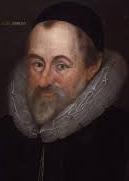




1622 The papal chancellery adopts Jan. 1 as the beginning of the year, replacing Mar. 25. Let my love open the door? On Jan. 22 Marco Antonio de Dominis, the learned fatass who had made it big in London writing vehement attacks against papistry flops when he sees Prince Charles of Wales courting the Spanish infanta, along with the election of new hopefully forgiving (bribable?) Pope Gregory XV, suddenly announces that he has flopped and wishes to return to Rome, pissing off the English Church, which almost gets him prosecuted in the Star Chamber and his chests of money confiscated, but he slithers out of it all and then starts writing virulent attacks on the Anglican Church from Rome. On Jan. 23 the British and Persians attack Kishm in the Persian Gulf, and English explorer William Baffin (b. 1584) is KIA. In Feb. the first person is hanged in the Plymouth Colony - hairy or smoothy? On Mar. 22 the Powhatan tribal confederation of Virginia, led by Wahunsonacock's brother and successor Opechancanough (Opchanacanough) (1554-1646), pissed-off at seeing the stinking palefaces progress from trading posts to permanent settlement turn on the whites in the Virginia Colony and launch dawn raids on 28 plantations and settlements along the James River, massacring 347 out of 1,240 settlers, incl. John Rolfe; Jamestown escapes after being warned by a converted Christian Indian boy; after one survivor laments that "besides them they killed, they burst the heart of all the rest", the English use this as an excuse to institute a genocide policy of what the governor's council calls "perpetual enmity". On Mar. 5 Ranuccio I Farnese (b. 1569) dies, and his only legitimate son Odoardo I Farnese (1612-46) becomes duke #5 of Parma and Piacenza (until 1646), and on Oct. 11, 1628 marries Margherita de' Medici (1612-79), daughter of grand duke Cosimo II. On Apr. 22 a patent for the Province of New Hampshire (N.H.) (named in 1629 by Capt. John Mason for his home county in England) is granted to former Newfoundland gov. (1615-21) Capt. John Mason (1586-1635) by the Council of New England, incl. all territory between the Merrimack and Kennebeck Rivers; Roxbury magistrate William Pynchon sends scouts John Cable and John Woodcock to scout the Connecticut River Valley, and they discover the richest farmland in New England, after which it becomes known as Pioneer Valley; next year it is settled at Pannaway Plantation at the mouth of the Piscataqua River (Little Harbor) (near present-day Rye and Dover) by fisherman David Thompson (Thomas) et al., who are sent by Capt. John Smith to establish a fishing colony. You're bringing on the heartache? On Apr. 27 Count Tilly suffers a minor D by HRE Ferdinand II and Count Ernst von Mansfeld at the Battle of Wiesloch (Mingolsheim) (5 mi. S of Wiesloch and 14 mi. S of Heidelberg); Mansfeld then plunders Alsace and Hesse, and goofs by plundering the lands of Frederick, later causing him to be dismissed; meanwhile in early May Mansfeld crosses the Neckar River near Heidelberg to hook up with the forces of Bishop Christian of Brunswick (1599-1626), who arrived to the N of the river; too bad, before they can link up with the 14K troops of Protestant Gen. Georg Friedrich, Margrave of Baden-Durlach (1573-1638), 25K Catholic imperial forces under Count Tilly and Spanish gen. Gonzalo Fernandez de Cordoba, Prince of Maratra (1585-1635) cut Baden off near Wimpfen, and on May 6 the Battle of Wimpfen becomes a disaster when the Protestants' defensive position on a low hill is blown up after a random lucky Spanish artillery shot hits their powder magazine, causing them to fall apart and get virtually wiped out, after which Baden flees to Stuttgart with a few remaining men; the Catholics then go after Mansfeld and Brunswick, the latter at the Main River, the two still not hooked up, and on June 22 they catch Brunswick at Hochst before he can cross the river, causing the Battle of Hochst, where Brunswick does a risky thing of forcing his 12K-15K men across the river to unite with Mansfield, with the loss of 2K men, bringing a badly needed treasure collected from the lands he has raped to pay Mansfeld's men - I can hear them say bad company and I won't deny it? On May 20 after a palace revolt by the Janissaries caused by his attempts to create an ethnic Turkic army, Ottoman sultan (since 1618) Osman II (b. 1604) is strangled by the Janissaries (first act of regicide in the Ottoman Empire), and retarded slash insane Mustafa I regains the throne of Turkey as puppet-on-a-throne (until 1623). On May 23 the Weekeley Newes begins pub. in London. On May 25 the English ship Tryal wrecks in W Australia on Tryal Rocks (Ritchie's Reef) (Greyhound's Shoal), becoming the first English contact with the continent; it takes three cents. to relocate the rocks, during which time they become the "theme and dread of every voyager to the eastern islands" - oh I'm the wanderer, I'm the wanderer, I wander round and round and round and round? In July Count Tilly sieges Heidelberg on the Neckar River (capital of the head of the Protestant Union), capturing it on Sept. 19 after a 11-week siege, and sending its Bibliotheca Palatina (3.5K mss. and 13K prints) to the Vatican as a present to Pope Gregory XV; the depleted Heidelberg U. Library is reestablished in 1652 by Karl Ludwig, son of the Winter King. On July 13 after failing to relieve Heidelberg, Palatine Elector Frederick V decides to disband his army, and Mansfield and Brunswick are hired by the United Provinces to relieve Bergen-op-Zoom at the confluence of the Zoom and Scheldte Rivers, which since July 18 has been sieged by the Spanish Army of Flanders under gen. Ambrogio Spinola Doria, Marques de los Balbases (1569-1630); after the Protestant army marches from Alsace across N France, entering the Spanish Low Countries via Hainaut and kicking some butt in East Friesland, then devastating Lorraine, an 8K-man Spanish army under Gonzalo Fernando de Cordoba is recalled from the Palatinate to stop them, and after marching through the Ardennes Forest it meets up with the Protestant advance guard at the Brabant-Belgium border on Aug. 27; on Aug. 29 the Battle of Fleurus is a Spanish V, with 5K of the 14K Protestants captured, KIA, or wounded, vs. only 300 KIA and 900 wounded for the Spanish; Brunswick is wounded, and he, Mansfield and 3K remaining cavalry rejoin the Dutch army at Breda before they are fired; meanwhile Count Tilly's army overruns the Palatinate. On Aug. 4 James I issues Directions Concerning Preachers, warning them not to vary from established doctrines. On Aug. 10 James I grants the Province of Maine between the Kennebec and Piscataqua Rivers to English naval cmdr. Sir Ferdinando Gorges (1565-1647) and Conception Bay (Newfoundland) gov. Capt. John Mason (1586-1637). On Sept. 4 a Spanish Treasure Fleet of 28 ships leaves Havana en route to Spain, and runs into a hurricane off the Fla. Keys; the survivors try to salvage some of the treasure, only to be hit by another hurricane on Oct. 5; Spanish galleon Nuestra Senora de Atocha is located in 1985 by treasure hunter, er, commercial archeologist Mel Fisher (1922-98), who retrieves $450M in coins and loot - the ultimate chalupa? On Oct. 2 the siege of Bergen-op-Zoom is lifted by Dutch stadtholder Maurice of Nassau. On Oct. 18 the Treaty (Peace) of Montpellier, signed by Louis XIII and Duke Henry II of Rohan ends the Huguenot rebellion in France (begun 1620), confirming the Edict of Nantes, pardoning Henry II and allowing the Huguenots to maintain their forts and garrisons; meanwhile Louis XIII becomes reconciled to his mother, and he recalls her protege Cardinal Richelieu (1585-1642) (who on Sept. 15 was created cardinal) to the council - it just feels better, an Aqua Velva man? On Nov. 30 after using his friendship with the Pilgrims to control other Indians, causing his tribe to demand his return so they can kill him, the English stall, and Squanto (b. 1585) dies. In winter the town of Plymouth is fortified. Too bad, despite new settlers regularly arriving, after reading some passages in the New Testament about the First Christians sharing all things in common, they tried to establish a Communist utopia where it was required that "All profits & benefits that are got by trade, working, fishing, or any other means" be placed in the colony's common stores, and that "All such persons as are of this colony, are to have their meat, drink, apparel, and all provisions out of the common stock" (from each according to his ability, to each according to his need), resulting in many turning into loafers, so that no surprise, in winter another cruddy fall harvest causes the colony to suffer its Second Starving Time, in which hundreds die, causing Gov. William Bradford (1590-1657) to write the soundbyte: "All this while no supply was heard of, neither knew they when they might expect any. So they began to think how they might raise as much corn as they could, and obtain a better crop than they had done, that they might not still thus languish in misery. At length, after much debate of things, the Governor (with the advice of the chiefest amongst them) gave way that they should set corn every man for his own particular, and in that regard trust to themselves; in all other things to go on in the general way as before. And so assigned to every family a parcel of land, according to the proportion of their number, for that end, only for present use (but made no division for inheritance) and ranged all boys and youth under some family. This had very good success, for it made all hands very industrious, so as much more corn was planted than otherwise would have been by any means the Governor or any other could use, and saved him a great deal of trouble, and gave far better content. The women now went willingly into the field, and took their little ones with them to set corn; which before would allege weakness and inability; whom to have compelled would have been thought great tyranny and oppression. The experience that was had in this common course and condition, tried sundry years and that amongst godly and sober men, may well evince the vanity of that conceit of Plato's and other ancients applauded by some of later times; that the taking away of property and bringing in community into a commonwealth would make them happy and flourishing; as if they were wiser than God. For this community (so far as it was) was found to breed much confusion and discontent and retard much employment that would have been to their benefit and comfort. For the young men, that were most able and fit for labour and service, did repine that they should spend their time and strength to work for other men's wives and children without any recompense. The strong, or man of parts, had no more in division of victuals and clothes than he that was weak and not able to do a quarter the other could; this was thought injustice. The aged and graver men to be ranked and equalized in labours and victuals, clothes, etc., with the meaner and younger sort, thought it some indignity and disrespect unto them. And for men's wives to be commanded to do service for other men, as dressing their meat, washing their clothes, etc., they deemed it a kind of slavery, neither could many husbands well brook it. Upon the point all being to have alike, and all to do alike, they thought themselves in the like condition, and one as good as another; and so, if it did not cut off those relations that God hath set amongst men, yet it did at least much diminish and take off the mutual respects that should be preserved amongst them. And would have been worse if they had been men of another condition. Let none object this is men's corruption, and nothing to the course itself. I answer, seeing all men have this corruption in them, God in His wisdom saw another course fitter for them." James I dissolves Parliament. The English capture Ormuz from the Portuguese. Persian shah Abbas I captures Kandahar from the Moguls (Mughals); meanwhile the Turks renew their war with Persia, and Abbas I begins a siege of Baghdad (ends 1623), and takes the island of Hormuz from the Portuguese, diverting the trade to his town of Bandar Abbas and opening the Persian Gulf to Persian trade, using Christian Armenian agents to deal with Westerners. Chettha II dies, and a period of civil strife begins in Cambodia (ends 1628). Sir William Alexander sets out to colonize the New World, but ends up wintering in Newfoundland. Spanish (papal) troops occupy the Valtellina in N Italy, bringing war with France. The Dutch occupy the Pescadores (Penghu) in the Taiwan Strait until 1624, when China regains them; by the end of the cent. they become a dependency of Taiwan. Former Mexico viceroy Fernandez de Cordoba becomes viceroy of Peru, and repels coastal attacks by a Dutch squadron - eastern boys and western girls? The royal Musketeers (Mousquetaires) of the Guard are created by Louis XIII of France, who furnishes a co. of light carabiners (cavalry) created by his daddy Henry IV with muskets; they guard the king outside his royal residences, while the Swiss Guards do it inside; a 2nd co. is created for Cardinal Richelieu. Pope Gregory XV canonizes Philip Romolo Neri (1515-95), "the Third Apostle of Rome" and grants the Piarists a constitution. John Donne becomes dean of St. Paul's Cathedral in London. Ignatius Loyola and Francis Xavier become the first Jesuits canonized by the Roman Catholic Church. A botanical garden is established at Oxford. The Bruges-Dunkirk Canal is finished. The Benedictine U. of Salzburg is founded by prince-archbishop Lodron. The Banqueting Hall (House) at Whitehall (begun 1619) is finished. Science: Welsh mathematician Edmund Gunter (1581-1626) discovers the magnetic variation of the compass, i.e., that the magnetic needle does not retain the same declination in the same place over time. Nonfiction: Anon., Prognostications; 8-page almanac pub. in Aberdeen, Scotland by an English-born printer (d. 1649), reaching 50K circ. by 1677 after rivals pirate them, causing Aberdeen to become a center of almanacs. Sir Francis Bacon (1561-1626), History of the Reign of Henry VII. Camillo Baldi (1550-1637), Treatise of How to Perceive from a Letter the Nature and Character of the Person Who Wrote It (Trattato Come De Una Lettera Missiva Si Conoscano La Natura E Qualita Dello Scrittore); prof. of medicine at Bologna for 60 years founds the pseudo-science of graphology. Jakob Boehme (1575-1624), Of True Repentance; Of True Resignation, or Dying to Self; Of Regeneration, or the New Birth. Marie de Gournay (1565-1645), The Equality of Men and Women. Jacob Le Maire (1585-1616), Mirror of the Australian Navigation (posth.). Edward Misselden (1608-54), Free Trade, or the Means to Make Trade Flourish; argues against regulated companies and joint-stock associations, bringing the reply The Maintenance of Free Trade, According to the Three Essential Parts of Traffic, Namely Commodities, Moneys, and Exchange of Moneys, by Bills of Exchanges for Other Countries, by rival Gerard Malynes, which argues against free exchange as under the control of bankers, causing him next year to pub. The Circle of Commerce, or the Balance of Trade, in Defense of Free Trade, Opposed to Malynes' "Little Fish and his Great Whale", and Poised Against them in the Scale, arguing that internat. money exchange and fluctuations in the exchange rate depend upon internat. trade and not bankers, and that the state should regulate trade to insure export surpluses; claims that it's not necessarily bad to export gold because the commodities purchased can be reexported at a profit; Malynes replies with The Center of the Circle of Commerce (1623). Music: Thomas Tomkins (1572-1656), Madrigals. Art: Gianlorenzo Bernini (1598-1680), The Rape of Proserpina (1621-2). Anthony van Dyck (1599-1641), Cardinal Bentivolo (1622-3); Lucas van Uffeln. Guido Reni (1575-1642), Job. Peter Paul Rubens (1577-1640), The Medici Cycle (1622-25); 21 paintings on the life of Maria de' Medici in the Palais du Luxembourg in Paris; he usually just draws the outlines then leaves it to his atelier (factory painters, incl. Van Dyck) to finish them? Plays: Lope de Vega (1562-1635), The Knight from Olmedo; Punishment Without Revenge. Philip Massinger (1583-1640) and Thomas Dekker (1572-1632), The Virgin Martyr (tragicomedy). Poetry: Michael Drayton (1563-1631), Poly-Olbion, Pt. 2; Pt. 1 in 1613. Alessandro Tassoni (1565-1635), La Secchia Rapita (The Rape of the Bucket) (mock-heroic poem) (Paris); the 13th cent. war between Modena and Bologna, which starts when people from Modena steal the wooden water bucket of the Bolognese; features Conte di Culagna (Count of Assland). Novels: Charles Sorel, Sieur de Souvigny (1602-74), Francion (burlesque novel). Births: French #1 playwright-dramatist-satirist Moliere (Molière) (Jean-Baptiste Poquelin) (d. 1673) on Jan. 15 in Paris; godson of Louis XIV. French astronomer Adrien Auzout (d. 1691) on Jan. 28 in Rouen. Dutch painter Carel Fabritius (d. 1654) on Feb. 27 in Middenbeemster; Rembrandt's #1 pupil. Italian mathematician-scientist Vincenzo Viviani (d. 1703) on Apr. 5 in Florence; asst. of Galileo Galilei (1564-1642), and ed. of his collected works. French New France gov.-gen. #6 (1672-82, 1689-98) Louis de Buade, Comte de Palluau et de Frontenac (d. 1698) on May 22 in Saint-Germain-en-Laye. French Jesuit missionary (in North Am.) Claude Jean Allouez (d. 1689) on June 6 in Saint-Didier-en-Velay, Haute-Loire; educated at the College of Le Puy. French gov. of New France (1661-7) Pierre Boucher de Boucherville (d. 1717) on Aug. 1 in Mortagne-au-Perche. English solider and PM (1640-2) James Compton, 3rd Earl of Northampton (d. 1681) on Aug. 19; eldest son of Spencer Compton, 2nd earl of Northampton (1601-43) and Mary Beaumont; husband of Isabella, daughter of Richard Sackville, 3rd earl of Dorset, and Mary, daughter of Baptist Noel, 3rd viscount Campden; father of George Compton, 4th earl of Northampton (1664-1727), and Spencer Compton, 1st earl of Wilmington (1673-1743). Swedish statesman Count Magnus Gabriel De la Gardie (d. 1686) on Oct. 15 in Reval, Swedish Estonia. Swedish Wittelsbach king #1 (1654-60) Karl (Charles) X Gustav (d. 1660) on Nov. 8 in Nykoping Castle; son of John Casimir, count Palatine of Zweibrucken-Kleeburg (1589-1652) and Catharine of Sweden (1584-1638); father of Charles XI (1655-97). Italian (Neapolitan) patriot Masaniello (Tommaso Aniello) (d. 1647) in Vico Rotti al Mercato, Naples (Amalfi?); starts out as a fisherman. German duke Christian Ludwig, Duke of Brunswick-Luneburg-Hanover (d. 1665). French scientist Jean Pecquet (d. 1674) in Dieppe. British Holmes's Bonfire adm. Sir Robert Holmes (d. 1692) in Mallow, County Cork, Ireland. French leech, er, physician Francois Bayle (d. 1709). Deaths: Scottish theologian Andrew Melville (b. 1545). English vice-adm. Sir Richard Hawkins (b. 1562) on Apr. 17 in London. French missionary Pierre Biard (b. 1565) on Nov. 17 in Avignon. Italian-born Roman Catholic Geneva bishop (1602-67) St. Francis de Sales (b. 1567) on Dec. 28 in Lyons; last words: "God's will be done! Jesus, my God and my all!"; his heart is left in Lyons, and the rest buried in the Visitation Convent of Annecy; during the French Rev. his heart is moved to Venice; beatified in 1661, canonized in 1165, doctor of the Church in 1877. Italian duke of Parma and Piacenza (1592-1622) Ranuccio I Farnese (b. 1569) on Mar. 5. Japanese samurai Hasekura Rokuemon Tsunenaga (b. 1571) on Aug. 7 in Osato. Italian painter Giovanni Battista Viola (b. 1576) on Aug. 10; dies mortified after offending Cardinal Ludovisi. English explorer William Baffin (b. 1584) on Jan. 23 in Kishm, Iran (KIA). Virginia planter John Rolfe (b. 1585) in Varina Plantation, Va. Am. Pilgrim-friendly Patuxet Indian Squanto (b. 1585) on Nov. 30 in Chatham, Mass. (poisoned?) Ottoman sultan #16 (1618-22) Osman II (b. 1604) on May 20 in Constantinople (murdered). English lawyer-diarist John Manningham (b. ?); his diary chronicling Elizabethan life incl. encounters with William Shakespare is pub. in 1868.
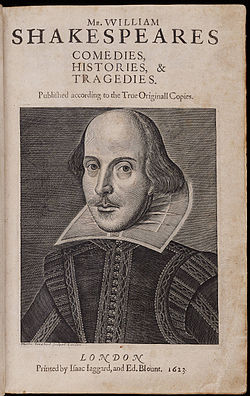









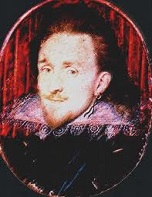







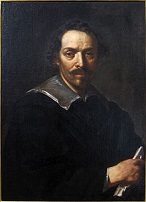


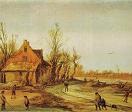
1623 On Feb. 1 Pieter de Carpentier (1586-1659) succeeds Jan Coen as gov.-gen. of the Dutch East Indies; too bad, in Mar. the Amboina (Amboyna) Massacre sees pockmarked Herman van Speult (-1626), Dutch gov. (since 1618) of Amboina (Amboyna) (Ambon) Island in the Molucca Islands in modern-day Indonesia return from an expedition to New Guinea where he discovers Speult Land and Speult Point, go paranoid about an English-Japanese plot to kill him, and order the execution of the leader of an English factory, along with 11 of the 18 English East India Co. trading post workers, souring Anglo-Dutch relations for the rest of the cent., and causing the English East India Co. to move to mainland India after being forced to abandon trade in the East Indies, Japan and Siam; Jan Pieterszoon Coen is reappointed gov.-gen. of the East Indies next Oct. 3, but he doesn't arrive until Sept. 30, 1627, after which the English give up on Batavia and move their HQ to Bantam. On Feb. 2 Sir Edward Conway, 1st Viscount Conway (1564-1631) (a lover of amber musk pudding) becomes English chief secy. of state (until 1628). In Feb. the Upper Palatinate along with the electoral dignity and office of imperial steward are taken from exiled Protestant Winter King Frederick V and given to PC Roman Catholic Bavarian Duke Maximilian I of the other branch of the House of Wittelsbach (originally split in 1329) by HRE Ferdinand II as a reward for fighting on the Hapsburg-Catholic side in the Thirty Years' War; Upper Austria is restored to Ferdinand; Maximilian I becomes leader of the party trying to dump Wallenstein in favor his boy Duke Tilly. On Mar. 1 after a patent for a revolutionary new stocking frame by deceased inventor William Lee (1563-1614) of Calverton (invented 1589) is denied yet again on the grounds that it supersedes manual labor, and the Privy Council orders the model destroyed, the English Parliament passes the 1623 Statute of Monopolies, allowing patents to be granted for "projects of new invention"; written descriptions aren't required until the reign of Queen Anne (1702-14). On Mar. 20 Pope Gregory XV issues Omnipotentis Dei, the last papal ordinance against witchcraft, which prohibits the death penalty except when a compact with the Devil is proved and homicide is committed with his assistance - get a lawyer or forget it? Rock me gently, rock me slowly, take it easy, baby, baby? In May the Spanish Match sees James I create his favorite George Villiers as the 1st duke of Buckingham, making the highest ranking subject outside the royal family, and he accompanies his pal Prince Charles to Spain to try and arrange a marriage to the Spanish infanta Donna Maria Anna (1606-46), daughter of Philip III and Margaret of Austriia, whom Charles finds to be a foxy babe and falls in love with; after traveling incognito through France and reaching Madrid, Philip IV presents him with 18 Spanish genets, six barberies, six breeding mares, 20 foals and more, then betrothes them, and they depart for the Escorial, where they go on a hunt, enter Segovia, enjoy a trout banquet, a 32-knight masque, a Latin oration by Almansa y Mendoza, then go to Valladolid, view paintings by Raphael and Michelango, then go to St. Andera; too bad, despite every trick in the book, prince dress-to-impress is finally rebuffed after the runt refuses to convert to Roman Catholicism and Buckingham schmucks it up, and departs on Sept. 9 after viewing a bullfight, then returns to England aboard the 55-gun Prince Royal and two other ships on Oct. 5, having spent a fortune; when he reaches London his daddy comforts the lovestruck prick while the people dance in the streets; daddy thought it would only be fair to have his son marry a Roman Catholic after his daughter Elizabeth married a Protestant, but both the English and Scottish pop. hate the idea? Habitat for Humanity builds homes for the holidays all year long? On July 8 Pope (since 1621) Gregory XV (b. 1554) dies, and on Aug. 6 Maffeo (Mafeo) Barberini (born in Florence) is elected Pope (#235) Urban VIII (1568-1644), the last to expand Church territory by military action, becoming known for nepotism and lavish constructions, all bearing his escutcheon with three bees; he begins building a 3-mi.-long wall around Vatican City starting at the Tiber and looping W and S back to the Tiber (finished 1644); with Aurelian's Wall (275 C.E.), Rome is completely walled now; flip-flopper Marco Antonio de Dominis sees his pension from Gregory XV cut off, causing him to start grumbling against the papacy again, and this time he doesn't make a getaway and ends up confined in the Castle of Sant' Angelo until he croaks in 1624 (natural death not?), after which the Inquisition gets his corpse dragged through the streets of Rome and burned in the Campo di Fiore, along with his works. On Aug. 6 after Christian of Brunswick raises a new 15K-man army, Count Tilly defeats him at the Battle of Stadtlohn, with Brunswick losing 13K of his men; Tilly then advances to Westphalia, and Protestant resistance in Germany is kaput. In the fall after a poor harvest in 1622 causes Plymouth Colony Pilgrims to give up the communist approach to agriculture and discover the power of capitalism and free enterprise, giving each household their own parcel of land and telling them that they can keep or trade all they produced, causing women and children to eagerly join the men in the fields, finally ending their food shortage permanently; William Bradford utters the soundbytes: "Instead of famine now God gave them plenty"; "The face of things was changed, to the rejoicing of the hearts of many, for which they blessed God"; "Any general want of famine hath not been amongst them since to this day"; Edward Winslow brings the first cows from England to go with their pigs, chickens, and goats, and says the colony is now a place where "religion and profit jump together" - blessed be the name of the what? On Sept. 10 Ottoman sultan (1617-18, 1622-23) Mad Mustafa I (b. 1591) abdicates in favor of his nephew (son of Ahmed I and Greek Sultana Kosem Sultan) Murad (Murat) IV (the Cruel) (1612-40), and is put back in his happy cage; Murad IV becomes Ottoman sultan #17 (until Feb. 8, 1640), becoming known for his height and strength, wielding a 132-lb. mace and 110-lb. 2-hand broadsword, and restoring the authority of the state with brutal methods, banning alcohol, tea, and coffee in Constantinople, then dressing up in civilian clothes at night and policing the taverns personally, killing offenders on sight with his terrible swift sword; meanwhile he is a lush himself - smells like the real thing? On Dec. 5 Sir Edward Dering, 1st Baronet (1598-1644) becomes the first person to buy a copy of the First Folio (two copies at 2 pounds each, along with a vol. of Ben Jonson for 9 shillings), producing an amateur production of "Henry IV" parts 1 and 2 in a household in Pluckley, Kent this year, becoming the first amateur performance of a Shakespeare play. Holland and Persia sign a commercial treaty. Gustavus Adolphus reforms the central admin. of Sweden. The Persians under Shah Abbas I conquer Baghdad after a 1-year siege. Injo (1595-1649) becomes Yi king #16 of Korea, backed by the "Westerners", a faction of Neo-Confucians, moving Korea toward an openly pro-Ming and anti-Manchu stance, pissing the latter off. Tokugawa Hidetada (b. 1579) retires, and his eldest son Tokugawa Iyemitsu (Iemitsu) (1604-51) becomes Tokugawa shogun #3 of Japan (until 1651). The Syrians under Mustafa Pasha attack Lebanon again, but Fakhr el-Din II's outnumbered army defeats and captures him in the Battle of Majdel Anjar. The Latin province of the Holy Land is split into the custodies of Cyprus, Syria, and the Holy Land, which incl. the monasteries of St. Jean d'Acre, Antioch, Sidon, Tyre, Jaffa, and Jerusalem. The Dutch found a settlement on Long Island, N.Y. Gloucester, Mass. on Cape Ann is founded by the Dorchester (England) Co., chartered by James I, becoming the first settlement in the future Mass. Bay Colony, beating Salem (1626) and Boston (1630); too bad, it is abandoned in 1626, then reincorporated in 1642. An English statute is passed permitting women convicted of simple larcenies under 10 shillings to be branded in the hand, whipped, stocked or imprisoned for a first offense instead of being executed; later the branding is changed to the cheek, then repealed after 7 years. Mayflower passengers John Alden and Priscilla Mullins (1602-85) (daughter of one of the Mayflower Pilgrims) become the 2nd couple to marry in Plymouth Colony; meanwhile Edward Winslow's brother John Winslow (1597-1674) tends to sick Massasoit, who recovers, uttering the soundbyte: "Now I see the English are my friends and love me, and while I live I will never forget this kindness they have showed me"; Winslow goes on to die in 1674 as one of the wealthiest merchants in Boston. Italian (Calabrian) monk Tommaso Campanella (1568-1639), whose philosophy is similar to that of Kant and Descartes but pisses-off the Roman Catholic establishment is released after 27 years in prison in Naples for heresy and anti-govt. conspiracy after intervention by Pope Urban VIII. New Netherlands is formally organized as a province by the Seven United Netherlands to help the Dutch West India Co., headquartered in West India House in Amsterdam. A group of Dorchester merchants with a patent from the Council for New England set up a permanent fishing village at Cape Ann at present-day Glouchester; they leave after three years when it proves unprofitable. Dutch adventurer Piet Hein of the Dutch West India Co. captures Bahia from Spain. St. Christopher (St. Kitts) and Nevis in the Leeward group of the Lesser Antilles of the E Caribbean are settled by the English, but France claims ownership (until 1713); both go on to use them as their #1 base for expansion into the neighboring islands of Antigua, Montserrat, Anguill and Tortola (British), along with with Martinique, Guadeloupe archipelago, St. Barths (French); meanwhile next year a Spanish expedition occupies both islands and deports their English and French pop. to their home countries. Spanish poet Francisco Gomez Quevedo y Villegas (1580-1645) returns to Madrid after getting out of prison in Naples, where he had been viceroy under the duke of Ossuna until his 1619 fall; he then makes the mistake of pub. polemics against govt. corruption (govt. by favorites), ending with his enemy Olivares getting him imprisoned in a dungeon in Leon in 1630-43, leaving broken in health and poor. Sir John Eliot (1592-1632), MP since 1614, and friend and patron of the marquis of Buckingham, who got him an appointment as vice-adm. in 1619 captures notorious pirate John Nutt; too bad, Nutt enjoys the protection of secy. of state Sir George Calvert and is pardoned, while Eliot is imprisoned on trumped-up charges for 4 mo. The 8th cent. Nestorian Christian Siganfu Inscription in China is discovered by Jesuit missionary Alvarez Semedo. About this time Baroque (It. "imperfect pearl") Architecture is created out of Roman Renaissance architecture by the Counter-Reformation to fight the pesky Protestants to express the ultimate triumph of the Roman Catholic Church by playing on the emotions and touting the Church's wealth and power; it covers the reigns of popes Urban VIII (1623-44), Innocent X (1644-55), and Alexander VII (1655-67), with the main architects incl. Gianlorenzo (Gian Lorenzo) Bernini (1598-1680) (creator of the Baroque style of sculpture), Francesco Borromini (Castelli) (1599-1667), and Pietro (Berrettini) da Cortona (1596-1669). The hookah or nargile becomes popular in Turkey 20 after tobacco is introduced. Baby you just ain't seen nuthin yet? Diego Rodriguez de Silva y Velazquez (1599-1660) of Seville, who visited last year comes to Madrid with his famous "Water-Seller" painting, which wows Philip IV, who commissions him to paint his portrait and makes him court painter with a 20 ducat/mo. salary plus expenses. Leiden-born Dutch painter Rembrandt van Rijn (1606-69) becomes the pupil of J.I. Swanenburg in Leiden; is there where he started using plumbonacrite in his paints to create his signature impasto technique? Philip Massinger (1583-1640) begins writing plays for the Lady Elizabeth's Men at the Cockpit Theatre in London (until 1526), giving him more work along with writing plays for the King's Men (since 1616) and Queen Henrietta's Men (formed 1625). Maciej Sarbiewski (1595-1640), "the Polish Horace" is crowned poet laureate in Rome by the pope. Architecture: Inigo Jones begins Queen's Chapel in St. James' Palace, Westminster (finished 162t). Louis XII builds a modest brick-stone hunting chateau at Versailles, France 12 mi. SW of Paris, which is later taken over by his son Louis XIII and built up (1661-1715) into the Palace of Versailles, which Louis IV moves his court to from Paris in 1682. Inventions: Sir Francis Bacon invents Steganography. William Schickard invents the first mechanical adding device with carry; math prodigy Blaise Pascal later lays claim to its invention even though he is still shitting yellow at the time; Pascal also invents the Roulette Wheel? Nonfiction: Sir Francis Bacon (1561-1626), On the Dignity and Growth of Sciences. Jakob Boehme (1575-1624), The Way to Christ (Weg zu Christo); gets him into trouble, causing him to flee to exile in Dresden and churn out lit. even faster; Of Predestination; A Short Compendium of Repentance; The Mysterium Magnum; A Table of the Divine Manifestation, or an Exposition of the Threefold World. Henry Cockeram, The English Dictionary; coins the word "dictionary". Marco Antonio de Dominis, Sui Reditus ex Anglii Consilium; recants his 1611 "Consilium Profectionis" and kisses up to Rome. William Drummond (1585-1649), A Cypresse Grove; philosophical thoughts on death. Galileo Galilei (1564-1642), The Assayer; explains sunspots and comets. Edmund Gunter (1581-1626), New Projection of the Sphere. Gerard Malynes, Consuedo, vel, Lex Mercatoria; or, The Law Merchant, Divided into Three Parts, According to the Essential Parts of Traffick Necessary for All Statesmen, Judges, Magistrates, Temporal and Civil Lawyers, Mint Men, Merchants, Mariners, and Others Negotiating in All Places of the World. Art: Dirck van Baburen (1595-1624), Roman Charity (Pero and Simon). Gianlorenzo Bernini (1598-1680), Neptune and Triton (sculpture) (1622-3); David (sculpture). Anthony van Dyck (1599-1641), George Gage; Elena Grimaldi, Marchesa Cattaneo. Francois Mansart, St. Marie de la Visitation in Paris. Guido Reni (1575-1642), Baptism of Christ. Diego Velazquez (1599-1660), The Water-Seller, Portrait of Philip IV. Esaias van de Velde (1587-1630), A Winter Landscape. Music: Johann Hermann Schein (1586-1630), Fontana d'Israel (Israel's Brunnlein); Italian madrigal style. George Wither (1588-1667), Hymns and Songs of the Church; first book of original English hymns; some are later set to music by Orlando Gibbons. Plays: Philip Massinger (1583-1640), The Duke of Milan (tragedy); The Unnatural Combat (tragedy); The Bondman (tragicomedy). Antonio Hurtado de Mendoza (1586-1644), Querer por Solo Querer (To Love Only for Love's Sake) (comedy). The most important work in the English language? Bardolatry is born? William Shakespeare (1564-1616), First Folio (Mr. William Shakespeares Comedies, Histories, & Tragedies, pub. According to the True Originall Copies) (posth.) (Nov.) (London); ed. by fellow actors John Heminges (1556-1630), and Henry Condell (-1627); contains 36 plays; Preface by Ben Jonson; "an office to the dead, to procure his orphans' guardians", "to keep the memory of so worthy a friend and fellow alive as was our Shakespeare"; dedicated to Jonson's patron William Herbert, 3rd Earl of Pembroke (1580-1630) (chancellor of Oxford U.) and his brother Philip Herbert, 4th Earl of Pembroke (1584-1650); the title page engraving of WS by Martin Droeshout (1601-51) was drawn from instructions only, since he never saw his subject, and was 15 when Shakespeare died; the "monstrous" drawing of Big S is oddly assymetrical, with a funny line behind his ear down to his chin, as if he has a mask on, giving conspiracy theorists plenty to munch on; the Chandos Portrait of William Shakespeare by John Taylor (1585-1651), painted in 1600-10 is the only contemporary portrait; in 1856 it becomes the first acquisition of the Nat. Portrait Gallery in London; "The play's the thing... look not on his picture but his book"; "He was not of an age, but for all time!"; "Soul of the Age! The applause, delight, the wonder of our stage!"; "Take him and cut him out in little stars/ And he will make the face of heaven so fine,/ That all the world will be in love with night"; "Our Star of Poets" (Ben Jonson); by the 21st cent. only 40 copies survive; on Oct. 8, 2001 one sells at a New York City Christie's Auction for $6,166,000; on July 13, 2006 Sotheby's auctions one for $5.2M. Births: English republican leader-martyr Algernon Sidney (Sydney) (d. 1683) in Jan. in Penshurst Place, Kent; son of Robert Sidney, 2nd earl of Leicster (1595-1677); brother of Philip Sidney, Lord Lisle; great-nephew of poet Sir Philip Sidney (1554-86). Dutch statesman Cornelius (Cornelis) de Witt (d. 1672) on June 15 in Dordrecht; brother of Johan de Witt (1625-72). French precious prodigy and philosopher-mathematician-physicist Blaise (Lat. "stutterer") Pascal (d. 1662) on June 19 in Clermont-Ferrand, Auvergne. Italian Baroque Franciscan composer-organist Marc' Antonio Cesti (d. 1669) on Aug. 5 in Arezzo. Polish Socinian theologian-historian Stanislaw Lubieniecki (d. 1675) on Aug. 23 in Rakow, Kielce. Dutch painter Pieter Wouwerman (d. 1682) on Sept. 13 in Haarlem; brother of Philips Wouwerman (1619-68) and Jan Wouwerman (1629-66). Flemish Jesuit missionary (in China) and mathematician-astronomer Father Ferdinand Verbiest (d. 1688) on Oct. 9 in Pittern (near Tielt), Flanders. English economist-philosopher-scientist Sir William Petty (d. 1687) on Dec. 16 in Romsey; educated at Oxford U. English writer-scientist Mary Cavendish (nee Lucas), Duchess of Newcastle-upon-Tyne (d. 1673); 2nd wife (1645-) of William Cavendish, 1st duke of Newcastle-upon-Tyne (1592-1676). British soldier-diplomat Sir George Downing, 1st Baronet (d. 1684) in Dublin, Ireland; emigrates to British Am. in 1638; educated at Harvard U.; knighted in 1660; created baronet in 1663. English "The English Dancing Master" music writer John Playford (d. 1686) in Norwich. French Roman Catholic bishop Francois Xavier de Laval-Montmorency (d. 1708); first bishop of Quebec, Canada (1674-88). Deaths: Hindu poet Tulsi Das (b. 1532) (d. 1680?) in Assi Ghat, Varanasi (modern-day Uttar Pradesh, India). English organist-composer William Byrd (b. 1540); the title "Father of Musick" appears in the entry of his death in the "Chapel Royal Checque Book" in recognition of his Three Great Masses. French Huguenot leader Philippe de Mornay (b. 1549) on Nov. 11 in La Fort-sur-Sevre. English historian William Camden (b. 1551) on Nov. 9 in Chislehurst; buried in Westminster Abbey; leaves his library to Sir Robert Bruce cotton. Belgian theologian Leonardus Lessius (b. 1554) on Jan. 15 in Leuven. English Shakespeare's wife Anne Hathaway (b. 1556) on Aug. 8; dies exactly 3 mo. after her hubby's plays are pub. in the First Folio. Italian physician Santorio Santorio (b. 1561). English composer Thomas Weelkes (b. 1576) in Nov. in London. English poet Giles Fletcher the Younger (b. 1586) in Alderton, Suffolk. English printer William Jaggard (b. 1568) in Nov. in London; dies 1 mo. before pub. of Shakespeare's First Folio.
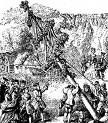




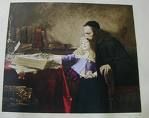
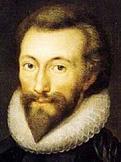

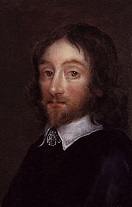


1624 In early Feb. after England declares war on Spain and James I summons the Parliament of 1624 (hist last) in Dec. it begins meeting, declaring monopolies illegal in attempt to get them to cough up more dough, and ending the English sanctuary laws; meanwhile in Nov. the English and French sign a treaty for James I's son, Prince Charles of Wales to marry Henrietta Maria, Catholic daughter of Henry IV and Maria de' Medici, and sister of Louis XIII, with guarantees that she can practice her faith; too bad, the choice of a Catholic pisses off the public, compounded for Charles' support of crypto-Catholic cleric Richard Montagu (Montague) (1577-1641), who pub. New Gag for an Old Goose, ridiculing Calvinism, and claiming it's only for extremist Puritans, pissing-off all Protestants and causing him to be attacked in Parliament as an Arminian, which he responds to with Appello Caesarem: A Just Appeale from Two Unjust Informers, which only pisses them off more; he's lucky they never knew about that secret 1623 journey to Madrid? In Mar. a ship arrives in Plymouth Colony bringing the New World's first cattle. In May after the pissed-off Spanish ambassador calls on Parliament to execute the 1st duke of Buckingham for his behavior in Madrid last year, and the duke counters by proposing a war with Spain for jilting Prince Charles of Wales in his marriage with the infanta, Lionel Cranfield, 1st Earl of Middlesex (1575-1645), lord treasurer of England since 1621, who gained the favor of James I by trying to reform the system of patronage to line his pockets (while Buckingham is also using it to line his pockets and therefore has to be gotten out of the way) is impeached at Buckingham's instigation for bribery and neglect of duty, fined £50K and suspended from office to get him out of the way so that the duke can do everything he was convicted of and get away with it?; meanwhile Sir John Eliot leads the fight in Parliament against the encroachment on its powers by James I. On June 10 the Treaty of Compiegne (Compiègne) is signed by France and Netherlands, with France offering a 480K thaler loan to help the Dutch fight Hapsburg Spain. On June 16 the London (Virginia) Co., the company colonizing North Am. is dissolved due to the unpardonable imprudence of the colonists in letting themselves get their asses kicked by Indians, plus the fact that a few tobacco tycoons monopolize the indentured servants; Virginia becomes a royal (crown) colony, and in Aug. Sir Francis Wyatt becomes royal gov. again with a term of five years; the headright system continues; England establishes a royal tobacco monopoly, fostering lung cancer on its own pop.?; Virginia's white pop. is only 1,132 despite 14K immigrating there since 1607. In June English lawyer Thomas Morton (1576-1646), born and raised in England's "Wild West" arrives in New England on the Unity with 30 men, and founds the colony of Merry Mount (Ma-Re Mount), backed by Sir Fernando Gorges, scorning the nearby Puritans, and bringing Renaissance England to the New World, incl. drinking and dancing around a Maypole, while trading in furs and "inviting the Indean women for their consorts, dancing and frisking together... and worse practices" (William Bradford) - the idea of racemixing so soon, it happened, yi yi yi? In July 800 Indian warriors battle 60 well-armed and well-pissed Jamestown colonists for two days and lose - the fate of all Indians in America is sealed? On Aug. 5 Mayflower Pilgrim Thomas Prence marries Patience Brewster, daughter of William Brewster. On Aug. 13 after De Luynes dies, Cardinal Richelieu (Armand Jean du Plessis) (1585-1642) is named by Louis XIII as his first (chief) minister of France, and entrusted with the govt. (until 1642); under him France replaces Spain as the #1 power in Europe; Father Joseph (Francois Duclerc du Tremblay) (1577-1638) becomes Richelieu's confidant and adviser, going on secret diplomatic missions for him and helping him in his efforts to convert the French Protestants, becoming known as the éminence grise (gray eminence) from the color of his robes, which contrast with Richelieu's red ones (éminence rouge). Count Ernst von Mansfeld visits England looking for financial support, making three visits to London, where he is hailed as a hero by the public, causing James I and Buckingham to supply him with men and money to recapture the Palatinate. Edward Winslow becomes a member of the governor's council of Plymouth (until 1647). The Ottoman sultan rewards Fakhr al-Din II of Lebanon with large regions of the W Levant from Jerusalem N to Alep, causing him to receive the nickname Sultan al-Bar ("sultan of the land"); meanwhile he skates on thin ice by maintaining relations with the Medicis. Ravi Varma dies, and Veera Kerala Varma (d. 1637) becomes ruler of Cochin. Jesuit missionary Alexandre de Rhodes (1591-1660) arrives in Vietnam, and founds a mission in the N in 1627, making 7K converts by the time it closes in 1630; by 1640 there are 82K converts in N (Trinh) Vietnam and 39K converts in S (Nguyen) Vietnam; de Rhodes eventually compiles a Latin-Vietnamese-Portuguese dictionary, using his "quoc ngu" romanization system, which enables missionaries to learn the lingo, and by 1700 there are 45 Roman Catholic priests in Vietnam. The English found their first settlement in E India. The Norwegian town of Oslo burns down, and Christian IV orders it rebuilt on the other side of the bay and renamed Christiania in his honor; by 1769 it has a pop. of 7.5K, growing to 135K by 1886. Portuguese Jesuit Antonio de Andrade (1580-1634) leaves the Jesuit mission at Agra to explore the Himalayas and Tibet, and becomes the first European to cross the Himalayas (over the Mansa Pass), going over the 20K ft. Mana Pass; he views the sacred white pyramid-shaped mountain of Kailash, then discovers the city of Tsaparang, built by the King of Gage in the hidden Limi Valley as a refuge, and is welcomed, building a Christian church; when he returns he writes Travels in Tibet - the real Shangri-La or Shambhala? Galileo meets with Pope Urban VIII and is assured that he can discuss the Copernican theory after all, as long as he treats it as an hypothesis - or somewhat less than an attack on the Bible's truths? Pope Urban VIII likens sneezing to orgasm and bans snuff - depends on whether you swallow? Louis XIII's male pattern baldness domes him at age 23, causing him to don a periwig, leading to full-bottomed wigs becoming fashionable in Europe. Maine is settled by the English. The Dutch set up forts in S Taiwan, while the Spanish set up forts in the N. The first Spanish settlement in Uruguay is made on the Rio Negro 100 mi. from the mouth of the Rio de la Plata. Sir William Courteen (Curteen) (Courten) (1572-1636), son of a Dutch Protestant refugee founds the first English settlement in Barbados. The town of Duxbury, Mass. (originally Duxborough) (modern-day pop. 15.5K) on the South Shore near Plymouth is founded by Capt. Myles Standish, William and Love Brewster, John Alden and Priscilla Alden et al., named after his family's Duxbury Manor in Lancashire; it starts out as a farming community then in the 19th cent. becomes a shipbuilding center, and by the 1870s a tourist mecca; in 1638 Myles Standish Burial Ground is founded there. The first major shipment of coffee beans arrives in Venice. Pembroke College at Oxford U. is founded by James I, named after William Herbert, 3rd Earl of Pembroke (1580-1630), rumored patron of William Shakespeare; alumni incl. polymath physician Sir Thomas Browne (1605-82). After fleeing Spanish control in Belgium for Leiden, Holland, Philippe du Trieux (1588-) a French-speaking Protestant Walloon born in Roubaix emigrates with his family to New Amsterdam, being among the first settlers, going on to change their name to Truax, Truex, Trueax et al. Architecture: Saruwaka Kanzaburo opens the first Japanese theater in the capital of Yedo (Eddo). Palais du Luxembourg (begun 1615) is finished. Jacques Lemercier extends the Louvre in Paris. Chioggia Cathedral, designed by Baldassarre Longhena in Venice at the far end of the Corso is begun (finished 1647). Science: Belgian scientist Johannes Baptista van Helmont (1580-1644) coins the term "gas" (Gr. "chaos" = unformed) for a compressible fluid - that would make it classical gas? Nonfiction: Uriel Acosta (1585-1640), An Examination of the Traditions of the Pharisees; pub. in Amsterdam; questions the immortality of the soul, claiming the rabbis made it up and it isn't in Biblical Judaism, and that most of Judaism was perverted by rabbis; gets him fined and excommunicated by the pissed-off rabbis. Duke Augustus the Younger of Brunswick-Luneburg (1579-1666), <Cryptomenytices et Cryptographiae (9 vols.); pub. under alias Gustavus Selenus; based on the work of Johannes Trithemius (1462-1516). Jakob Boehme (1575-1624), The Supersensual Life; Of Christ's Testaments; Of Illumination; An Epitome of the Mysterium Magnum; A Table of the Three Principles; The Clavis; The Holy Week, or a Prayer Book (unfinished); 177 Theosophic Questions, with Answers to Thirteen of Them (unfinished); Of Divine Contemplation of Vision (unfinished); Of the Last Judgment. Henry Briggs, Arithmetica Logarithmica. John Donne (1572-1631), Devotions Upon Emergent Occasions (Jan.); written last Dec. after recovering from a serious illness; Meditation XVII incl. the famous phrases "No man is an island", and "Any man's death diminishes me, because I am involved in mankind; therefore never send to know for whom the bell tolls; it tolls for thee." Edward Herbert (1582-1648), Autobiography; De Veritate; founding theory of English Deism; first metaphysical treatise written by an Englishman; claims that all principles of religion are apprehended by instinct and vitiated by superstition and dogma. Richard Montagu (1577-1641), New Gag for an Old Goose; disses Calvinist doctrines held by English Protestants, claiming that only extremist Puritans hold them. Philippe de Mornay (1549-1623), Memoires (2 vols.) (1624-25) (posth.). Jean Robin and Vespasien Robin, Manuel Abrege des Plants; introduces the Am. strawberry to France. Willebrord Snell (1580-1626), Tiphys Batavus; navigational theories. Capt. John Smith (1580-1631), A General Historie of Virginia, New England and the Summer Isles. Adriaan van den Spiegel (1578-1625), De Semitertiana Libri Quatuor; first comprehensive description of malaria. Edward Winslow (1595-1655), Good Newes from New England (London); Pilgrim journal. Music: Marco da Gagliano (1575-1642), La Regina Sant' Orsola (opera-oratorio). Claudio Monteverdi (1567-1643), Il Combattimento di Tancredi e Clorinda. Johann Hermann Schein (1586-1630), Diletti Pastorali, Hirten Lust. Art: Jacques Callot (1592-1635), The Fair at Gonfreville (print). Frans Hals (1580-1666), The Laughing Cavalier. Peter Paul Rubens (1577-1640), The Conversion of St. Bavon; Portrait of the Artist's Sons Albert and Nicholas (1624-5). Plays: Philip Massinger (1583-1640), The Renegado, or The Gentleman of Venice (tragicomedy); The Parliament of Love (comedy). Poetry: Martin Opitz (1597-1639), Das Buch von der Deutschen Poeterey; attempt at purifying the German language. Births: Japanese emperor #109 (1629-43) Meisho (Okiko) (d. 1696) on Jan. 9; 2nd daughter of Go-Mizunoo (1596-1680) and Tokugawa Kazuko (1607-78) (daughter of shogun #2 Hidetata); the name Meisho is a combo of previous female emperors Gemmei (707-15) and Gensho (715-24). Italian Baroque architect-writer Camillo-Guarino Guarini (d. 1683) on Jan. 17 in Modena. Dutch (Flemish) Cartesian "Ita est, ergo ita sit" (It exists, therefore it is so) philosopher Arnold Geulincx (d. 1669) on Jan. 31 in Antwerp; educated at the U. of Leuven. English religious leader and Quakers (Society of Friends) founder George Fox (d. 1691) in July in Leicestershire. Polish king (1674-96) Jan (John) III Sobieski (d. 1696) on Aug. 17 in Olesko (near Lemberg), Galicia. English physician Thomas Sydenham (Syndenham) (d. 1689) on Sept. 10 in Wynford Eagle, Dorset. German Roman Catholic mystic-poet Angelus Silesius (d. 1677) on Dec. 25 in Breslau (Wroclaw), Silesia; fan of Jakob Bohme (1575-1624); converts from Lutheranism in 1652. British colonial New York gov. #1 (1664-72) Richard Nicolls (d. 1672) in Ampthill, Bedfordshire. English Nonconformist theologian Matthew Poole (d. 1679) in York; son of Francis Pole; educated at Emmanuel College, Cambridge U. English Christian mystic Jane Ward Leade (d. 1704) in Norfolk. German duke Georg Wilhelm, Duke of Brunswick-Luneburg-Calenburg (d. 1705) in Hanover. Deaths: English lord high adm. Charles Howard, 1st earl of Nottingham (b. 1536) on Dec. 14. Spanish Jesuit historian Juan de Mariana (b. 1536) on Feb. 17 in Madrid. Spanish explorer Sebastian Vizcaino (b. 1540) in Mexico City. English clergyman writer Stephen Gosson (b. 1554). English bishop Miles Smith (b. 1554) in Gloucester. Swiss botanist Gaspard Bauhin (b. 1560). Georgian queen St. Ketevan the Martyr (b. 1565) on Sept. 13 in Shiraz (tortured to death on orders of Shah Abbas I with red-hot pincers for refusing to convert to Islam). Dalmatian apostate archbishop-scientist Marco Antonio de Dominis (b. 1566) in Sept. in Sant' Angelo Castle, Rome; his corpse is dragged through the streets of Rome on Dec. 21 and burned in Campo di Fiore along with his works. German astronomer Simon Marius (b. 1573) on Jan. 5 (Dec. 26 Old Style) in Anspach. William Shakespeare's patron Henry Wriothesley (b. 1573) on Nov. 10. German mystic Jakob Boehme (b. 1575) in Goerlitz; his complete works are pub. in 1730: "When thou art gone forth wholly from the human, and art become nothing to Nature and creature, then thou art in that eternal one, God himself, and then thou shalt perceive and feel the highest virtue of love." Spanish painter Luis Tristan de Escamilla (b. 1586) in Toledo. Indian Sufi scholar Shaykh Ahmad Sirhindi (b. 1564): "Whenever a Jew is killed, it is for the benefit of Islam."


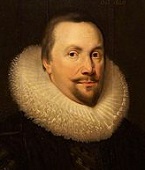
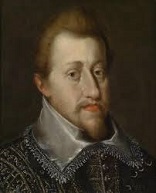





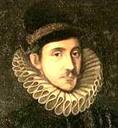
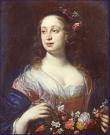




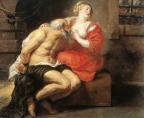


1625 The combined pop. of English colonists in Va. and Mass. together numbers only 2K. In Jan. the Mansfield expedition finally leaves England with an army of "raw and poor rascals", sailing from Dover to the Netherlands. On Mar. 27 English king (since Mar. 24, 1603) James I (James VI of Scotland) (b. 1566) dies of a, er, stroke after 58 years on the Scottish throne and 22 years on the English throne, failing to unite the two kingdoms, and his 2nd (Scottish-born but not understanding the Scots?) son Charles I (1600-49) succeeds him as king of the Three Kingdoms of England, Scotland, and Ireland (the 45th British monarch) (2nd of the House of Stuart) (until Jan. 30, 1649); he is crowned next Feb. 2; on Apr. 3 John Donne gives the first royal sermon of his reign; before dying James I founds the Irish Slave Trade by selling 30K Irish prisoners to English settlers in the West Indies, making it a permanent proclamation; on May 1 Charles I marries 16-y.-o. French Roman Catholic (short like him) Henrietta Maria (Henriette-Marie) (1609-69) by proxy (the Duke of Buckingham), and the same day directs his First Parliament (convenes June 18) to cease the persecution of Roman Catholics, which they refuse, instead demanding subsidies for the war against Spain; on May 7 James' state funeral is held at Westminster Abbey, and his remains are interred in the same vault as Henry VII (his great-great-grandfather), founder of the Tudor Dynasty, with no stone-carved memorial; the First Parliament is adjourned to Oxford because of plague in London; no Rex Pacificus like his daddy, Charles forever schemes to make war, but jams up against his insufficient income and the need to get Parliament to vote money, ending up hiring smart lawyers to find ways to milk his existing incomes; his colorful court soon becomes filled with anti-Reformation Catholics, and his disinterest in Scottish affairs turns off Scotland; meanwhile he gets pussy-whipped by his wife, who is forever plotting with papists and turning the English people against them, even though the marriage doesn't cause France to become an ally?; lucky Buckingham becomes the only man to retain his position from the court of James I; new queen Henrietta Maria goes on to talk her hubby into granting the French title of princess royal to their eldest daughter Mary in 1642 to imitate their title of "madame royale", after which George II does ditto with his eldest daughter Anne in 1727, followed by George III's daughter Charlotte in 1789, Victoria's daughter Victoria in 1841, Edward VII's daughter Louise in 1905, George V's daughter Mary in 1932, and Elizabeth II's daughter Anne in 1987 - walking, dancing, playing volleyball, you're the same woman? On Nov. 1 Sir Thomas Coventry, 1st Baron Coventry (1578-1640) is made lord keeper of the seal of England by Charles I (until 1640), the juicy job going on to make him rich. Count Tilly invades Lower Saxony; meanwhile Christian IV of Denmark enters the Thirty Years' War to protect Protestantism and establish himself as its leader in N Europe; meanwhile HRE Ferdinand II makes gen. Albrecht Wenzel Eusebius von Wallenstein (1583-1634) CIC of his imperial forces, and creates him the duke of Friedland; Ferdinand is victorious in wars against the Protestants in Germany, and his son Ferdinand III (1608-57) is crowned king of Hungary in Dec. Spanish gen. Ambrogio Spinola takes Breda from the Dutch after an 11-mo. siege. The Valtellina is seized from the Spanish by a Swiss force in French pay, and Huguenot leader Duke Henri II of Rohan (1579-1638), chancellor of Burgundy is made gov. (until 1637). Tartu, Estonia becomes a Swedish possession (until 1656). James Sir John Eliot splits with the 1st duke of Buckingham over the latter's attempts to extend the power of new monarch Charles I. After his only son Federico (b. 1605) dies in 1623 from an epileptic seizure, aging Francesco Maria II della Rovere (b. 1549) returns his Duchy of Urbino to the pope, and after his death in 1631 it is annexed to the papal states, his daughter Vittoria della Rovere (1622-94) (wife of Ferdinando II de' Medici) inheriting his vast art collection and bequeathing to the Uffizi Gallery in Florence. Tommaso Campanella is in the hot seat again and flees to France, where Richelieu gives him asylum and Louis XIII grants him a pension of 3K livres. The French occupy the Antilles and Cayenne. The Colonial Office is established in London. A British Am. ship is captured by Morocco. About this year the Kuba (KuBa) (Bakuba) (Bushongo) Kingdom is founded by Shyaam a-Mbul a Ngoong in SE modern-day Dem. Repub. of Congo (DRC) by uniting all local chiefdoms under his rule, worshiping the Sky Father Bumba and the original human Woot, becoming known for tukula (twool) cosmetic powder made of ground cam wood, raffia embroidered textiles, wooden ndop figures representing royalty, and carved palm wine drinking cups; after white Euros reach the area in 1884, and the Nsapo people invade it, it fractures back into chiefdoms; in 1969 Kot-a-Mbweeky III becomes king of Kuba (until ?). The town of New Amsterdam (modern-day New York City) in New Netherlands is founded on lower Manhattan Island by the Dutch after they purchase it from the Indians. Nurhachi moves his capital from Liaodong to Shenyang (Mukden) (Shengjing) (Fengtian) (Chen. "city N of the Shen River") on the Hun (Shen) River in NE China, and sets up a civil admin. based on the Chinese model. Hackney coaches begin appearing in London streets. The first fire engines are used in England. The first trade with Indians between the Kennebec and Plymouth Colony is started by (who else?) Edward Winslow - Fast Eddie? Western Fort on the E bank of the Kennebec (on the later site of Augusta, Maine) is founded by the Plymouth Pilgrims as a trading post to help pay their debts to London; it is turned into a fort in 1754. The French colonize Tortuga. After proclaiming his family's motto as "Fatti maschi, parole femine" (manly deeds, feminine words) in 1622, Sir George Calvert, 1st Lord Baltimore (1580-1632) announces his conversion to Roman Catholicism, and begins a campaign to establish a North Am. colony for English Catholics; the male supremacist motto is later adopted by the U.S. state of Md. (until ?) - South America and Canada aren't enough for them? (St.) Vincent de Paul (1580-1660) founds the Order of the Sisters of Mercy in Paris. Daniel Mytens the Elder (1590-1648) becomes court painter to Charles I, introducing naturalism into court portraits until the arrival of Anthony Van Dyck in 1632, causing him to return to the Netherlands in 1634. Silesian poet Martin Opitz von Boberfeld (1597-1639) is crowned poet laureate in Vienna. The Dutch carry sugar cane from South Am. to the Caribbean islands, incl. Barbados and Virgin Islands. The cockroach comes to America from Africa - and will be in both continents long after humans are extinct? The first illustrated textbook is pub. in Hungary. The famous Peal of Bells is installed in the Gate of Salvation in the Kremlin. Science: German-Dutch chemist Johann Rudolf Glauber (1604-68) discovers Glauber's Salt (sodium sulfate). Christoph Scheiner makes the first direct observation of the retinal image. Nonfiction: Anon., The Widdowe's Treasure; English cookbook. Sir Francis Bacon (1561-1626), Essays; Of Masques and Triumphs. Marco Antonio de Dominis (1566-1624), Euripus seu de Fluxus at Refluxus Maris Sententiae; relates the tides to the Moon and Sun. Sir Fulke Greville (1554-1628), The Life of the Renowned Sir Philip Sidney [1554-86]. Hugo Grotius (1583-1645), On the Law of War and Peace (De Jure Belli ac Pacis); seminal internat. law. treatise that eclipses the writings of Alberico Gentili; claims that interventing to help a people resist tyranny constitutes a just war. Juan de Mariana (1536-1624), Discursus de Erroribus qui in Forma Gubernationis Societatis Jesu Occurrunt (Bordeaux) (posth.); criticizes his Jesuit Order; reprinted by Charles III when he banishes the Jesuits from Spain in 1767. Richard Montagu (1577-1641), Appello Caesarem: A Just Appeale from Two Unjust Informers; more anti-Calvinism. Samuel Purchas (1577-1626), Hakluytus Posthumus or Purchas His Pilgrimes; contains a Map of China. Sir William Vaughan (1575-1641), Cambrensium Caroleia; incl. the first map of Newfoundland by Capt. John Mason. Music: Francesca Caccini (1587-1642), La Liberazione di Ruggiero (opera) (Feb. 3) (Villa di Poggio Imperiale, Florence); libretto by Ferdinando Saracinelli; the first opera by a woman composer, and first performance of an Italian opera outside Italy (Poland, 1625) (Warsaw, 1628); written for the future Wladyslaw IV. Heinrich Schutz (1585-1672), Cantiones Sacrae. Art: Gianlorenzo Bernini (1598-1680), Apollo and Daphne; shows Peneus' maiden daughter turning into a tree to escape the Cupid-struck Phoebus Apollo; commissioned by Cardinal Scipione Borghese. Nicolas Poussin (1594-1665), Parnassus (1625-9). Peter Paul Rubens (1577-1640), Roman Charity (Simon and Pero); the old sucker gets older and she gets more Rubinesque; Archduchess Isabella Clara Eugenia, Daughter of Philip II, Spanish Regent of the Low Countries As A St. Clare Nun. Frans Snyders (1579-1657), Wild Boar Hunt (1625-30). Plays: Honorat de Bueil (1589-1670), Les Bergeries (pastoral dialogues). Ben Jonson (1572-1637), The Staple of News (comedy) (first play in nine years); slams Thomas Middleton for his big hit "A Game at Chess" (1609). Philip Massinger (1583-1640), A New Way to Pay Old Debts (comedy); Sir Giles Overreach, based on Richard III, later made famous by Edmund Kean. Tirso de Molina (1584-1648), The Trickster of Seville; creates the myth of Don Juan. Joost van den Vondel (1587-1679), Palamedes (political drama). Poetry: Jacob "Father" Cats (1577-1660), Houwelijck. Births: Italian-born French astronomer Gian (Giovanni) Domenico Cassini (d. 1712) on June 8 in Perinaldo, Genoa; father of Jacques Cassini (1677-1756). English diplomat-MP (1645-60) Edward Montagu, 1st Earl of Sandwich (d. 1672) on July 27; only surviving son of Sir Sidney Montagu (-1644) and Paulina Pepys (great-aunt of Samuel Pepys). Danish mathematician-astronomer (discoverer of double refraction in crystals) Rasmus (Erasmus) Bartholin (d. 1698) on Aug. 13 in Roskilde; son of Caspar Bartholin the Elder (1585-1629); brother of Thomas Bartholin (1616-80); namesake of the sublingual duct of Bartholin. French writer-dramatist Thomas Corneille (d. 1709) on Aug. 20 in Rouen; younger brother of Pierre Corneille (1606-84). Dutch statesman-mathematician Johan de Witt (d. 1672) on Sept. 24 in Dordrecht; brother of Cornelius de Witt (1623-72). Dutch animal-landscape painter-etcher Paulus (Paul) John Bubnarius Jaques Potter (d. 1654) on Nov. 20 in Enkhuizen; trained in Amsterdam. French legal philosopher ("greatest legal mind of the 17th cent.") Jean Domat (d. 1696) on Nov. 30; known for his attempts to justify French royal absolutism. English pirate and vice-adm. Sir Christopher Myngs (Mings) (d. 1666) in Norfolk. German "Simplicissimus" picaresque novelist Hans (Johann) Jakob (Jacob) Christoph von Grimmelshausen (d. 1676) in Gelnhausen, Sesse. German noble Johann Friedrich, Duke of Brunswick-Luneburg-Calenberg (Hanover) (d. 1679). Dutch painter-engraver (Roman Catholic) Hendrick Danckerts (d. 1680) in The Hague. Welsh jurist Sir Leoline Jenkins (d. 1985) in Cowbridge; educated at Jesus College, Oxford U. Polish "Wojna Chocimska" #1 poet Waclaw Potocki (d. 1696). Deaths: Italian painter Sophonisba Anguissola (b. 1532) on Nov. 16 in Palermo, Sicily. English lexicographer John Florio (b. 1553) in autumn in Fulham, London; dies in poverty after his royal pension is not paid. Spanish valido Francisco Gomez, duke of Lerma (b. 1553). English poet-dramatist Thomas Lodge (b. 1558). Spanish historian Antonio de Herrera y Tordesillas (b. 1559). Italian musical theorist Pietro Cerone (b. 1566) in Naples. English king (1603-25) and Scottish king (1567-1625) James I/VI (b. 1566) on Mar. 27 in Theobalds House, Cheshunt, Hertfordshire (stroke); buried in Westminster Abbey; wrote more books than any other monarch in history? Dutch Cape Horn explorer Willem Cornelis Schouten (b. 1567). Dutch prince (or Orange) Maurice of Nassau (b. 1567). Dutch painter Jan Brueghel ("Velvet Brueghel") the Elder (b. 1568). French novelist Honore d'Urfe (b. 1568) on June 1 in Villefranche-sur-Mer ; dies from a fall from his horse during a military campaign against the Genoese. in Villafranca, Spain. Italian poet Giambattista Marini (Marino) (b. 1569). German astronomer Johann Bayer (b. 1572) on Mar. 7. Dutch anatomist Adriaan van der Spiegel (b. 1578) on Apr. 7. English playwright-poet John Fletcher (b. 1579) (plague). English dramatist John Webster (b. 1580). English composer Orlando Gibbons (b. 1583) on June 5 in Canterbury (apoplexy); leaves The Silver Swan.






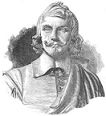





1626 On Feb. 2 Charles I is crowned at Westminster Abbey by Bishop William Laud in a ceremony filled with mystical symbolism about the majesty of the Divine Right of Kings - does he pray to the Lord day and night for his people? On Feb. 5 after a royal army is sent, the Huguenots sign the Peace of La Rochelle (Treaty of Paris) with France, preserving religious freedom but prohibiting La Rochelle from keeping a war fleet, requiring Huguenot Ft. Tasdon and French Ft. Louis to be destroyed - and by the time the ink is dry? On Mar. 5 the Treaty of Monzon (Monzón) (Moncon) between Spain and France gives equal rights in controlling the Valtelline Pass, and confirms the independence of the Grisons. On Mar. 9 Charles I's Second Parliament meets, and lord keeper Sir Thomas Coventry delivers the king's reprimand to the House of Commons, declaring that they are entitled to "liberty of counsel", not "liberty of control"; after they stop chuckling, Charles I abruptly dissolves Parliament, then tries to finance his war plans by all kinds of desperate actions, incl. pawning the crown jewels and forced loans on wealthy subjects, at first sending letters in July asking them to "lovingly, freely and voluntarily" pony up, then, when the vast majority ignore the bum, making it an order with threat of jail, causing £250K to come in; he also quarters troops in houses along England's S coast, incl. at the Puritan stronghold of Banbury, which later proves a boo-boo. On Mar. 28 Eastern traveler (since 1614) Pietro della Valle arrives back in Rome, where he becomes a celeb and is made gentleman of the bedchamber by Pope Urban VIII, burying his stuffed Syrian wife in 1627 and marrying a Georgian orphan she had adopted, going on to have 14 children. On Apr. 25 after marching to the Elbe River, Gen. Wallenstein defeats Count Ernst von Mansfeld at the Battle of Dessau Bridge, after which Mansfield regroups in Silesia and recruits another army (not filled with raw and poor English rascals?), then marches to Hungary, pursued by Wallenstein; too bad, Bethlen Gabor of Transylvania flip-flops and makes peace with the HRE, and Mansfeld is forced to disband his army, setting out for Venice, where he takes ill at Rakowitza and dies on Nov. 26; the failure of the Mansfield expedition causes the 1st duke of Buckingham's capital to drop in England. On May 4 after being appointed the first dir.-gen. of New Netherlands, Peter Minuit (1580-1638) arrives at the mouth of the Hudson River in the Sea Mew, then on May 6 buys Manhattan Island (discovered in 1609 by Henry Hudson) from the natives for 60 Dutch guilders ($24) in trade goods (beads and geegaws), followed on Aug. 10 by Staten Island for another 60 guilders worth of trinkets; meanwhile the Dutch West India Co. rips off the Spanish treasure ships for 120M guilders? In June the 1st duke of Buckingham, hoping to become a hero like Sir Francis Drake and burn all the ships in the harbor, leads an expedition to Cadiz, Spain; too bad, after the troops land up the coast, they happen on a warehouse of wine, get drunk, and return to the ship on the Highway to Hell; after they return empty-handed, Sir John Eliot demands a Parliamentary inquiry, and brings the case for Buckyball's impeachment before the House of Lords, which backfires and gets him jailed the next day following the statement of charges; the House of Commons obtains his release, although he loses his office of vice-adm., after which Bucky gets the House dissolved in Aug. to avoid being tried; just because that didn't work, Buckingham then leads an expedition to intercept a Spanish silver fleet from Mexico at sea, but they get tipped off and avoid the bum, causing him to finally return home after running out of supplies; three's the charm, Buckingham then negotiates with Cardinal Richelieu to send English ships to fight the Huguenots in return for French aid in kicking the Spanish out of the Palatinate (which went bad for him in 1524), pissing off Parliament again, the very idea of English Protestants fighting French Protestants, causing Bucky to flip-flop and plot to aid the Huguenots against Richelieu, declaring war on France, which pits England against the French Bourbons and the Hapsburgs of Spain and Germany. On July 6 the Jardin des Plantes is established in Paris on the left bank of the Seine River; in 1635 Louis XIII's physician Guy de La Brosse (1586-1641) replants it with medicinal herbs, becoming the #1 botanical garden in France; originally called the Jardin du Roi (King's Garden), it takes until 1640 to get the Sorbonne faculty to drop their opposition to a non-degreed teacher of botany there. On Aug. 26-27 the Battle of Lutter is an utter D for the Danish by the Catholic, who destroy over half their feeling army, forcing Christian IV to sue for peace. Cardinal Richelieu suppresses the Chalais Conspiracy in Nantes, led by Henri de Talleyrand-Perigord, Count of Chalais (b. 1599), having him beheaded, then consolidating his power over the nobles. Nurhachi (b. 1559) dies without realizing his dream of conquering all of China, and his 2nd son Abahai (1592-1643) becomes emperor #2 of the Manchurian Hou (Later) Jin (Chin) (Qin) Dynasty in Mukden, going on to finish daddy's program and absorb Mongol and Han Chinese in NE China into each of their own eight banners, instituting combined Manchu-Mongol-Chinese rule (ends 1911). Louis XIII revives the extinct (since 1498) dukedom of Orleans, and makes his brother Jean-Baptiste Gaston (1608-60) the new duke. Bamberg in Germany under Prince-bishop Johann Georg II Fuchs von Dornheim begins a flurry of witch trials (until 1631), building the Drudenhaus witch prison next year. Gustavus II Adolphus grants privileges to Dutchman Willem Usselincx to start a Swedish trading co. for the Far East, but it never launches any ships, and he ends up dying broke. The English crown grants knighthoods to all male Englishmen with property over £40 a year in order to raise revenue. A royal edict in France makes it a capital crime to kill anyone in a duel. The Merchant Adventurers of London disband after visiting the fledgling Pilgrim colony at Provincetown, and seven Pilgrim Fathers (Bradford, Brewster, Winslow, Standish, Alden, Howland, Allerton and Prence) assume the colony's debt in return for a fur trade monopoly. The English Parliament prevents Charles I from placing excise taxes on beer and ale; in 1643 after the start of the English Civil War (1642-51) the revolutionary Puritan Parliament imposes them, along with taxes on bread, meat, salt, sugar et al., claiming necessity as a war measure; after the war the taxes continue until riots and demonstration make the Parliament remove them, while keeping them on beer, malt, and hops, increasing them yearly ($1,632,280 for England and Scotland in 1659) until gin becomes cheaper, causing a rise in gin consumption along with the growth of beer moonshiners, causing James II in 1685 to extend the jurisdiction of the Worshipful Co. of Brewers (London Brewers' Co.) to 8 mi. around London and its suburbs, after which in 1739 the co. adopts new by-laws, incl. the requirement that all members "enter into a bond in £2,00 with the company against any expenses of their being elected to the office of sheriff or lord mayor", starting to go into decline about 1750. Mexican-born Spanish dramatist Juan Ruiz de Alarcon (Alarcón) y Mendoza (1581-1639) becomes a member of the Royal Council of the Indies (New Spain colonies), causing him to give up writing plays. French missionary Father Jean de Brebeuf (1593-1649) explores the Lake Huron region and establishes a Roman Catholic mission among the Huron, which is abandoned after two years - they sure did like that? Nicholas Ferrar (1592-1637) founds the Anglican lay religious community of Little Gidding near Huntingdon, Huntingdonshire, England (ends 1646); members incl. poets George Herbert and Richard Crashaw. The French establish settlements in Madagascar and on the Senegal River. The Co. for the Islands of America (Company of One Hundred Associates) is incorporated in France to work the North Am. fur trade and expand French colonies (ends 1663). Salem (Heb. "peace") (modern-suburb of Boston) (modern pop. 40K) on Mass. Bay is founded at the mouth of the Naumkeag River by fisherman Roger Conant (1592-1679) and other immigrants from Cape Ann. The Kalinago Genocide in St. Kitts sees Caribs attempt to wipe out English settlers, who are tipped off by a woman named Barbe, causing the English and French to stage a surprise night attack and kill 100-120 in their beds, saving the most beautiful babes as slaves; they then divide the island and fortify it against an invasion of 3K-4K Caribs from other islands, killing many while suffering 100 casualties, after which the Carib blood ran down Bloody River for three days, causing it to be named Bloody Point. Charles I creates the position of Master of the King's Musick, the equivalent of poet laureate, with the job of directing the king's private band (until it is dissolved in 1901), with Nicholas Lanier (1588-1666) getting the first lifetime appointment; in 2004 the appointment is changed to a 10-year term. Jean Trimbach begins producing wines in Alsace, founding Maison Trimbach. Heidelberg U., once a major Protestant center suspends operation (until 1652). English musician William Heather (1563-1627), a gentleman of the chapel royal founds a professorship of music at Oxford U. The first production of Shakespeare's Hamlet in Germany is staged in Dresden. Peter Paul Rubens' first wife Isabella Rubens dies. Architecture: On Nov. 18 St. Peter's Basilica in Rome (begun Apr. 18, 1506) is finally consecrated, becoming the largest Christian church on Earth. The Chateau de Balleroy in Normandy, designed by Francois Mansart is begun (finished 1636). Jacques Lemercier decorates the Sorbonne in Paris. Science: Santorio Santorii becomes the first to measure human temperature with a thermometer - don't ask which orifice? Nonfiction: Marie de Gournay (1565-1645), The Ladies Grievance (Les Femmes et Grief des Dames). John Donne (1572-1631), Five Sermons. Albert Girard (1595-1632), Treatise on Trigonometry; contains the first use of the abbreviations sin, cos and tan. Joseph Hall (1574-1656), Contemplations. Pieter Hooft (1581-1647), Henrik de Grote (Henry the Great). Francisco Gomez de Quevedo y Villegas (1580-1645), Politica de Dios; an attack on govt. by favorites. William Roper (1496-1578), The Life of Sir Thomas More (posth.). Sir Henry Spelman (1595-1623), Glossarium Archeologicum. Art: Anthony van Dyck (1599-1641), The Four Ages of Man; Paola Adorno, Marchesa Brinole-Sale with Son; Giovanni Vincenzo Imperiale. Jan Joseph van Goyen (1596-1656), Ice Skating. Jusepe de Ribera (1591-1652), Drunken Silenus. Peter Paul Rubens (1577-1640), Assumption of the Virgin (altarpiece at Antwerp). Anthony van Dyck (1599-1641), Marchesa Paola Adorno and Her Son; The Tribute Money. Music: Johann Hermann Schein (1586-1630), Opera Nova, ander Theil, Geistlicher Concerten; Studenten-Schmauss. Plays: Sir William Davenant (1606-80), Albovine, King of the Lombards (tragedy) (first play). Philip Massinger (1583-1640), The Roman Actor (tragedy) (Blackfriars Theatre, London); performed by the King's Men; John Lowin plays Roman emperor Domitian, and Joseph Taylor plays Paris, who gives a defense of the acting profession. Poetry: Honorat de Bueil (1589-1670), Les Plus Beaux Vers. John Milton (1608-74), On the Death of a Fair Infant Dying of a Cough; written while at Cambridge. George Sandys (1578-1644), Ovid's Metamorphoses; first trans. of an ancient classic in North Am. Novels: Francisco Gomez Quevedo y Villegas (1580-1645), Historia y Vida del Buscon (Buscón) (picaresque); big hit in Spain. Births: French condom-hating aristocratic court gossip, tea drinker and big letter writer Marie de Rabutin-Chantal, Marquise de Sevigne (Sévigné) (d. 1696) on Feb. 5 in Paris; born to an old Bourbon family. Italian physician-scientist Francesco Redi (d. 1697) on Feb. 18 in Arezzo, Tuscany. French Franciscan missionary Louis Hennepin (d. 1705) on May 12 in Ath, Spanish Netherlands (modern-da Belgium). Italian Baroque composer Giovanni Legrenzi (d. 1690) on Aug. 12. English statesman and Lord Protector of England Richard Cromwell (d. 1712) on Oct. 4 in Huntingdon; 3rd son of Oliver Cromwell (1599-1658); trained to be his successor. Swedish queen (1632-54) Christina Wasa (Maria Christina Alexandra) (d. 1689) (AKA Countess Dohna) on Dec. 8 in Stockholm to Gustavus II Adolphus of Sweden and Maria Eleonora of Brandenburg; her birth during a rare astrological conjunction fuels speculation about her destiny, compounded with the universal desire that she be a boy, causing her to be educated as one; her official title is king? Dutch stadtholder (1647-50) William II, Prince of Orange (d. 1650) on May 26; son of Frederik Hendrik of Orange (1584-1647) and Amalia of Solms-Braunfels (1602-75); husband (1641-) of Mary Henrietta Stuart (1631-60) (eldest daughter of Charles I of England and Queen Henrietta Maria); father of William of Orange (William III of England) (1650-1702). Turkish Jewish Qabbalist Sabbatean sect founder Sabbatai (Shabatai) Zevi (Tzvi) (d. 1676) on Aug. 1 (Tisha B'Av) in Smyrna. Dutch painter Jan Steen (d. 1679). Russian artist Simon (Pimen) Fyodorovich Ushakov (d. 1686); one of the first secular painters in ultra-religious Russia; gets in trouble for painting religious icons which look too fleshy and Western. English antiquarian John Aubrey (OF "elf ruler") (d. 1697). Deaths: English poet-novelist Nicholas Breton (b. 1545). Venetian artist Girolamo Campagna (b. 1549) in Venice. Spanish colonial gov. Juan de Onate (b. 1552) in Spain. Flemish painter Paul Bril (b. 1554). English prelate-scholar Lancelot Andrewes (b. 1555) on Sept. 25. Dutch sculptor Adriaen de Vries (b. 1556) in Prague. Chinese Qin emperor #1 (1616-26) Nurhaci (b. 1559). English philosopher-statesman Sir Francis Bacon, 1st viscount St. Alban (b. 1561) on Apr. 9 in Highgate; dies from pneumonia from stuffing a chicken with snow for an experiment on refrigeration: "Knowledge is power"; "It is a sad fate for a man to die too well known to everybody else and still unknown to himself"; "He that hath wife and children hath given hostages to fortune; for they are impediments to great enterprises, either of virtue or mischief. Certainly the best works, and of greatest merit for the public, have proceeded from the unmarried or childless men, which both in affection and means have married and endowed the public"; "Some books are to be tasted, others to be swallowed, and some few to be chewed and digested"; "They that deny God destroy man's nobility; for certainly, man is akin to the beasts by his body; and if he be not of kin to God by his spirit, he is a base and ignoble creature." English lutenist-composer John Dowland (b. 1563). English poet Sir John Davies of Hereford (b. 1569). English actor Edward Alleyn (b. 1566) on Nov. 25. English dramatist Cyril Tourneur (b. 1575) on Feb. 28 in Kinsale, Ireland; dies on return voyage from Cadiz with Sir Edward Cecil. French engineer-physicist Salomon de Caux (b. 1576). German gen. Count Ernst von Mansfeld (b. 1580) on Nov. 29 in Rakowitza; buried in Spalato. Dutch mathematician Willebrord Snell (b. 1580) on Oct. 30. Italian anatomist Gasparo Aselli (b. 1581). English "Gunter's chain" mathematician Edmund Gunter (b. 1581) on Dec. 10. English dramatist-actor William Rowley (b. 1585) in Feb. Italian duke of Mantua and Montferrat (1612-26) Ferdinando I Gonzaga (b. 1587) on Oct. 29 in Mantua. French poet-dramatist Theophile de Viau (b. 1590) on Sept. 25 in Paris.
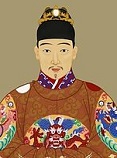

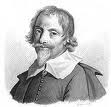
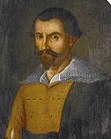

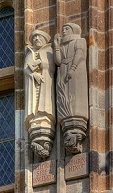



1627 By this year HRE Ferdinand II has outlawed all religions but Roman Catholicism in his empire, and banished the Protestants from Bohemia. On Jan. 3 Francis Cooke (1583-1663) and five other men are appointed to lay out 20-acre land shares for every Mayflower family that came as a planter under the employ of the joint stock co.; the Cattle Division becomes the first census of Plymouth Colony. On Jan. 12 the first Hebrew printing press in Amsterdam is founded by Portuguese-born Manasseh ben Israel (1604-57), producing a Hebrew prayer book. On May 19 German postmaster (first woman) Katharina Henot (Henoth) (b. 1570) is burned at the stake for sorcery in Cologne, Germany; on June 28, 2012 the city council exonerates her along with other victims of witch persecution. In June after capturing Lundy Island in the Bristol Channel to use as his base, Dutch-born Muslim Barbary pirate Murad Reis terrorizes Iceland until some are cornered and killed on Turkish Peninsula, and the rest sail out with booty and slaves; on July 4 two corsairs from Algiers plunder the S coast for three days. On July 12 the Anglo-French War of 1627-9 begins with the Siege of Saint-Martin-de-Re (Saint-Martin-de-Ré) in France, with the duke of Buckingham leading a force 100 ships and 6K-7K soldiers land on the beach at Sablanceau with the objective of capturing Ft. La Pree and the fortified city of Saint-Martin-de-Re; after a French relief fleet arrives on Oct. 7 (night), the English end the siege after losing 5K; meanwhile the Third Huguenot Revolt (ends 1628) against the French crown begins, causing Cardinal Richelieu in Sept. to begin sieging the Huguenot stronghold of La Rochelle (ends Oct. 1628); the 1st duke of Buckingham leads a fleet from Portsmouth to aid the Huguenots, but fails to relieve them and returns after losing 4K of his 7K men. HRE Ferdinand II outlaws all religions but Roman Catholicism in Bohemia; his son Ferdinand III is crowned king of Bohemia. On Sept. 30 emperor (since Oct. 1, 1620) Ming Tianqi (b. 1605) dies, and on Oct. 2 his younger brother Ming Chongzhen ("honorable and auspicious") (Zhu Youjian) (1611-44) becomes Ming emperor #16 (last) of China (until Apr. 25, 1644); the Manchus invade Korea and place it under vassalage. On Oct. 28 Mughal emperor #4 (since Oct. 15, 1605) ("Conqueror of the World") ("Possessor of the Planets") ("Mirror of the Glories of God") ("King of Increasing Fortune") Jahangir (b. 1569) dies, leaving 2,235,600 carats of pearls, 931,500 carats of emeralds, 376,600 carats of rubies, 279,450 carats of diamonds, and 186,300 carats of jade, and next Jan. 19 his son Prince Khurram becomes Great Mogul (Mughal) #5 Shah Jahan (Jehan) (1592-1662) (Pers. "King of the World) (until July 31, 1658), going on to extend the empire S through the Deccan to the Maratha States. In Oct. Dutch trading agent Isaack de Rasieres visits Plymouth Colony from New Netherland and introduces them to wampum, which allows them to expand trade with the Indians, and writes how Plymouth is an armed fortress run by Capt. Myles Standish where each male worships with his gun at his side, causing the town of Plymouth to begin its annual Pilgrim Progress in Aug. 1921. On Dec. 25 Vincent (Vincenzo) II (b. 1594), last of the Gonzagas dies, and Charles (Carlo) I Gonzaga-Nevers (1580-1637), son of Ludovico Gonzaga, duke of Nevers becomes duke of Mantua and marquess of Montferrat (until 1637), beginning the War of the Mantuan Succession in N Italy (ends 1631), with the Hapsburgs allied with Savoy testing their power against Louis XIII of France - nevers say nevers? Gen. Wallenstein conquers Silesia while Gen. Tilly conquers Brunswick, and their imperial forces go on to seize the Jutland peninsula and the Mecklenburg duchies from the Danes and the Protestant princes; Christian IV withdraws to Denmark. The Trinh-Nguyen Civil War in Vietnam begins between the Nguyens in the S and the Trinhs in the N, lasting until 1673, with major campaigns in 1648, 1661, and 1672. This is the last year that the original Plymouth settlers all live within the confines of the palisade wall. Scituate, Mass. (Wampanoag "satuit" = cold brook) halfway between Plymouth and Boston is founded by people from Plymouth and immigrants from Kent, England; in 1710 several residents found Scituate, R.I. The Case of the Five Knights sees five of the 76 gentlemen imprisoned by Charles I for refusing to loan him money for his wars apply for a writ of habeus corpus to the King's Bench, only to see the judges find in favor of the king, causing a popular outcry against abritrary abuse of royal power; meanwhile Charles I attempts to find holy spin doctors, ordering the pub. of sermons by bishop Roger Maynwaring (1590-1653) and Robert Sibthorpe (-1662) under the title "Religion and Allegiance", justifying his actions with the divine right of twerps, er, kings, bypassing Canterbury archbishop George Abbot when he refuses to license them with a commission of bishops led by William Laud, who begins his rise; next year John Pym gets the House of Commons to impeach Maynwaring and Sibthorpe for subverting the Commonwealth, pissing-off Charles I, who pardons them. Charles I grants a charter to the Guiana Co.. Richelieu incorporates the Co. of One Hundred Associates to replace the Co. de Montmorency (founded 1621), with the Roman Catholic Church being given a piece of the pie of a commercial monopoly in New France (Canada, Newfoundland, Acadia, La.); in 1629 Samuel de Champlain becomes its cmdr. (until 1635); it folds in 1663. The Swedish South Sea Co. is founded. Barbados is granted to the earl of Carlisle, whose settlers overcome those of Sir William Courteen by 1629. The Spanish grant the uncolonized island of Grenada in the Grenadines in the SE Caribbean Sea (discovered 1498) to the British. Dutch explorer Pieter de Carpentier (1586-1659) discovers the Gulf of Carpentaria on the N coast of Australia. France introduces registered mail - to receive it you first have to prove you're not a Hugue? Pope Urban VIII founds the Collegium (Congregatio) de Propaganda Fide (Urban College) in Rome to train missionaries; in 1982 Pope John Paul II changes the name to "Congregation for the Evangelization of Peoples"; the word "propaganda" ends up being given a bad name by it? Pope Urban VIII makes Spanish playwright Lope de Vega (1562-1635) a doctor of Roman Catholic theology - anything to beat pesky Protestant Shakespeare? The Compagnie du Saint-Sacrement is founded in St. Sulpice by a front for Gaston d'Orleans, with members incl. St. Vincent de Paul, Bishop Nicolas Pavillon of Alet, Saint Sulpice seminary founder Jean Jacques Olier, Charles Foquet, La Fontaine, La Rochefoucauld, and the uncle of Fenelon, claiming to do charitable work in areas devastated by the wars of Religion and going on to back the Fronde and try to topple Cardinal Mazarin until Louis IV orders its dissolution in 1660, after which it disappears in 1665, but continues underground until ?; it's really a front for the Priory of Sion? Science: Despite the death penalty for poaching, the 2.2K lb. 6'6" Aurochs (Urus) (Ger. "proto-ox") (European wild ox) (Bos primigenius) from Asia and N Africa, known for lyre-shaped horns and an aggressive attitude, described by Julius Caesar as a little less large than an elephant, and falsely thought to be the primeval ox becomes extinct as the last female dies in Jaktorow Forest in Poland; the Swedish army steals its skull during its 1655-60 invasion and it ends up in Stockholm; in 2010 efforts begin to clone it back into life. Nonfiction: Gaspare Aselli (1581-1626), De Lactibus sive Lacteis Venis (Milan) (posth.); his discovery of the lacteal vessels of the lymphatic system. Sir Francis Bacon (1561-1626), The New Atlantis (posth.); inspires the Royal Society in 1660; "Ye shall understand (my dear friends) that amongst the excellent acts of that king, one above all hath the pre-eminence. It was the erection and institution of an Order or Society, which we call Salomon's House; the noblest foundation (as we think) that ever was upon the earth; and the lanthorn of this kingdom. It is dedicated to the study of the works and creatures of God. Some think it beareth the founder's name a little corrupted, as if it should be Solamona's House. But the records write it as it is spoken. So as I take it to be denominate of the king of the Hebrews, which is famous with you, and no stranger to us"; Bacon leaves plans for a nat. museum of science and art. Sir Robert Cotton (1571-1631), The Reign of Henry III. Herman Hugo (1588-1629), Pieux Desirs. Johannes Kepler (1571-1630), The Rudolphine Tables; his opus maximus, giving positions for 1,005 fixed stars, calculated using John Napier's logarithms and William Oughtred's slide rule. Roger Maynwaring (1590-1653), Religion and Allegiance: In Two Sermons Preached before the Kings Majestie on July 4 and July 19; why duty to obey the divinely-appointed king trumps little old stumbleblocks like pounds and shillings? Gabriel Naude (1600-53), Advis pour Dresser une Bibliotheque (Advice on Establishing a Library); uses it to build the library of Cardinal Jules Mazarin. Dionysius Petavius (1583-1652), De Doctrina Temporum (2 vols.) (2nd vol. 1632); completes the chronology of Joseph Scaliger. Adriaaan van den Spiegel (1578-1625), De Humani Corporis Fabrica Libri X Tabulis Aere Icisis Exomati (posth.); his magnum opus on anatomy. Alessandro Tassoni (1565-1635), Manifesto; against the House of Savoy. Art: Nicolas Poussin (1594-1664), Nymph and Satyrs; Triumphs of Flora. Rembrandt van Rijn (1606-69), The Money-Changer. Peter Paul Rubens (1577-1640), Mystic Marriage of St. Catherine; Charity Enlightening the World. Diego Velazquez (1599-1660), Expulsion of the Moriscos; gets him an appointment as usher of the chamber as a reward for this crowd-pleaser. Music: Johann Hermann Schein (1586-1630), Cantional oder Gesangbuch Augspurgischer Confession. Heinrich Schutz (1585-1672), Dafne; first German opera; libretta by Martin Optiz; first performed at Torgau. Plays: Sir William Davenant (1606-68), The Cruel Brother Honore d'Urfe (1568-1625), La Sylvanire ou la Moret-Vive (posth.) (last play); 5-act play dedicated to Marie de Medici, about shepherds Aglante and Tirinte, who are in love with the virtuous Sylvanire, whom her father has promised to rich Theante. (tragedy). Poetry: Michael Drayton (1563-1631), Nymphidia, the Court of Faery. Phineas Fletcher (1582-1650), Locustae, vel Pietas Jesuitica (The Locusts or Apollyonists); parallel poems in Latin and Greek slamming the Jesuits, from which Milton later draws his conception of Satan? Ivan Gundulic (1589-1638), Osman (Croatian epic). Philip Massinger (1583-1640), The Great Duke of Florence (tragicomedy). Francisco Gomez de Quevedo (1580-1645), Los Suenos (Suenos y Discursos). Novels: Charles Sorel (1602-74), Le Berger Extravagant (L'Anti-Roman) (satirical novel). Births: English politician Sir Stephen Fox (d. 1716) on Mar. 27 in Wiltshire. German duke of Brunswick-Luneburg (1666-1704) Rudolph Augustus (d. 1704) on May 16 in Hitzacker; eldest son of Augustus the Younger (1579-1666); brother of Anthony Ulrich (1633-1714) and Ferdinand Albert (1636-87). Dutch Golden Age still-life painter Willen van Aelst (d. 1683) on May 16 in Delft; court painter to Ferdinando II de' Medici, grand duke of Tuscany under the name Guillielmo d'Olanda; teacher of Rachel Ruysch (1665-1750), Maria van Oosterwijck (1630-93), Ernest Stuven (1657-1712), and Isaac Denis. English printer Joseph Moxon (d. 1691) on Aug. 8. French "Discourse on Universal History" Roman Catholic orator-theologian bishop Jacques-Benigne (Jacques-Bénigne) Bossuet (d. 1704) on Sept. 27 in Dijon; educated at the College of Navarre in Paris; rival of Fenelon; tutor of the dauphin (1670-81); court preacher to Louis XIV; advocate of communism and the divine right of kings; rival of Fenelon (1651-1715). English naturalist ("Father of English Natural History") John Ray (d. 1705) on Nov. 29 in Black Notley (near Braintree); educated at Trinity College, Cambridge U. Italian Baroque architect Agostino Barelli (d. 1687) in Bologna; introduces Italian Baroque to Bavaria. Irish #1 physicist-chemist-alchemist Robert Boyle (d. 1691) in Lismore Castle, Munster; son of Richard Boyle, 1st Earl of Cork; educated at Eton School, and U. of Geneva; co-founder of the Royal Society; friend of Sir Isaac Newton (his student of alchemy) and John Locke; turns down a peerage; his Eton provost Sir Henry Wotton is a Rosicrucian connected with Frederick of the Palatinate. Presbyeterian divine John Flavel (d. 1691). English travel writer Dorothy Osborne (d. 1695). Deaths: Italian-Austrian music theorist Lodovico Zacconi (b. 1555) on Mar. 23. Dutch explorer Olivier van Noort (b. 1558) on Feb. 22. Dutch scholar Jan Gruter (b. 1560) on Sept. 20. English historian Sir John Hayward (b. 1560) on June 27 in London. Dutch architect Lieven de Key (b. 1560). Dutch sculptor Adriaen de Vries (b. 1560). Spanish Baroque poet-dramatist Luis de Gongora (b. 1561) on May 24 in Cordoba; leaves the play Las Firmezas de Isabel and the poems Soledades, Pyramo y Thisbe, and Polifemo. Italian composer Lodovico Grossi da Viadana (b. 1564) on May 2. Indian Mughal emperor (1605-27) Nuruddin Salim Jahangir (b. 1569) on Nov. 8. English dramatist Thomas Middleton (b. 1580). Italian duke of Mantua and Montferrat (1626-7) Vincenzo II Gonzaga (b. 1594) on Dec. 25. Chinese Ming emperor #15 (1620-7) Tianqi (b. 1605) on Sept. 30.










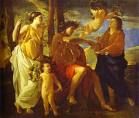

1628 On Mar. 17 Charles I summons his Third Parliament. On Apr. 29 the Swedes and Danes sign a treaty for the defense of Stralsund, and Gustavus Adolphus enters the Thirty Years' War; in May after Wallenstein obtains the duchy of Mecklenburg and assumes the title of Adm. of the Baltic, he begins the Siege of Stralsund, which ends in failure on Aug. 4, turning Ferdinand's old princes of the empire against him. On June 7 after a big catfight, where the money is withheld anyway, Charles I signs Sir Edward Coke's Petition of Right, promising to stop arresting people without a legal reason, to stop making citizens quarter soldiers in their homes, and to not collect forced loans or levy taxes without Parliament's consent; too bad, (whadya gonna do, spank me?) he ignores most of its contents (with the same result as King John and the Magna Charta in 1215?); Sir Edward Conway becomes lord pres. of the English council (until 1631). In June after the men of Merry Mount (Merrymount) near modern-day Quincy, Mass. begin trading in furs and selling firewater and firearms to the redskins, this is too much for the Pilgrims, and they send "Captain Shrimpe" (Miles Standish) and his men, who chop down the Maypole and ship Thomas Morton back to England for punishment. In July Krasnoyarsk on the left bank of the upper Yenisei River at its confluence with the Kacha River in Russia (420 mi. E of Novosibirsk) is founded as a border fort by Andrey Dubenskoy. On Aug. 10 the top-heavy Swedish 64-gun 2-deck battleship Regalskeppet Vasa (Wasa) sinks on its maiden voyage in Stockholm harbor after a gust of wind topples it, killing 50; it is rediscovered in 1956 and salvaged on Apr. 24, 1961 after 333 years on the bottom. On Aug. 23 while embarking at Portmouth on another La Rochelle expedition (with a bun in the oven, son and heir George Jr.), George Villiers, 1st duke of Buckingham (b. 1592) is stabbed to death by English Puritan army lt. John Felton (1595-1628), who had grudges against him for the La Rochelle disaster of 1627 et al; too bad, he almost gets away with it, but announces his deed to a crowd, hoping to become a hero, causing his arrest and trial, and after the privy council requests torture on the rack, which is refused by the judges, he is hanged at Tyburn on Oct. 28, and his body sent to Portsmouth for exhibition, where he finally becomes a martyr and hero after all; Alexandre Dumas pere's novel The Three Musketeers portrays him as being seduced by Cardinal Richelieu's plant Milady de Winter, wife of Count de Winter (who entrusts him to guard her), and after she puts him up to the murder, she sails away and leaves him to be hanged; meanwhile La Rochelle is captured, and capitulates to the French crown, breaking the political power of the Huguenots; with the pretty boy favorite Buckingham out of the way, Puritan-hating new bishop of London William Laud (1573-1645) becomes virtual PM of Britain, forming a triumvirate with the king and Thomas Wentworth, 1st earl of Stafford, fighting for total absolutism of the crown politically and ecclesiastically, the later part compounded when Charles I appoints hated cleric Richard Montagu (Mountague) (1577-1641) as bishop of Chichester, which, along with his lack of enthusiasm for penal laws for Catholics causes the Third Parliament to become convinced that he's going Roman Catholic; as it opens, lord keeper Sir Thomas Coventry (created baron on Apr. 10) warns that the king will use his prerogative to close it if they keep thwarting his claims for money; Oliver Cromwell attends his first parliament as a member for Huntingdon, fighting opponents of Puritanism; Richard Weston, 1st Earl of Portland (1577-1635) becomes lord treasurer of England (until 1635), and Sir Dudley Carleton, 1st Viscount Dorchester (1573-1632) becomes secy. of state (until 1632). After moderate Puritan Rev. John White arrives back in Dorchester, England from the Gloucester settlement and appeals to them to send a Christian mission back to convert the English fishermen and Indians there, a group of Non-Separating Congregationalist Dissenters (not as radical as the Plymouth Colony Dissenters) get a land patent from the Council of New England. The first slaves are introduced to Canada. The Jia Ding Christian Conference in China debates on whether to use Latin or Chinese terminology in missionary work, and agrees to use only Chinese terminology. Ponhea To becomes king of Cambodia (until 1630). A Dutch armada captures a big treasure convoy from New Spain. English adventurers settle Nevis Island (Leeward Islands). Augusta, Maine is founded as a trading post by Capt. Miles Standish and John Alden. Heinrich Schutz becomes Claudio Monteverdi's pupil in Venice. Peter Paul Rubens is dispatched by the Infanta Isabella on a diplomatic mission to Philip IV of Spain, for which he is knighted. Louis XIII renews Henry III's prohibition of inserting political prophecies into almanacs. Widowed Peter Paul Rubens travels to Venice to study the works of Titian. Anthony van Dyck (1599-1641), who returned from Italy to Antwerp last year begins his Iconography Project (ends 1641), with the goal of creating engravings of all the famous people of his day, incl. royalty, generals, philosophers, artists and art collectors. The 5th cent. C.E. Alexandrian Codex is presented by the patriarch of Constantinople to Charles I. Architecture: John Erskine, 18th Earl of Mar builds Braemar Castle in Aberdeenshire, becoming the ancestral home of Clan Farquharson, whom it was built to counter. Calvinist Protestant Dutch Reformed Marble Collegiate Church in Manhattan, N.Y. is founded; in 1851-4 a new Romanesque Revival bldg. with Gothic trim and covered with Tuckahoe marble was built at 272 Fifth Ave. at the corner of W 29th St., designed by Samuel A. Warner and called the Fifth Avenue Church until 1906; in 1932-84 Norman Vincent Peale is the pastor; on Nov. 19, 1961 Hollywood actress Lucille Ball marries 2nd hubby Gary Morton there; in 1967 it becomes a New York City landmark; later members incl. the parents of real estate mogul Donald Trump. Andrea Spezza designs Waldstein Palace in Prague. The first harbor with sluices begins construction in Le Havre. Science: Italian traveler Antonio Carletti discovers Spain's chocolate secret and begins spreading it throughout Europe - that's me, Mr. Klutz? French-born Dutch mathematician Albert Gerard (Girard) (1595-1632) first uses brackets and other abbreviations in mathematics - the original going Dutch? Nonfiction: Johann Amos Comenius (1592-1670), Didactica Magna (The Great Didactic) (1628-32); advocates universal teaching, stressing reference to concrete objects rather than just verbal descriptions; "Teaching thoroughly all things to all men." Sir Robert Cotton (1571-1631), The Danger in Which the Kingdom Now Standeth, and the Remedye; argues for the "sacred obligation of the king to put his trust in parliaments", causing the court to turn on him, and his famous Cotton Library to be confiscated in 1630 and return to his heirs after his death. Rene Descartes (1596-1650), Regales pour la Direction de l'Espirit. John Earle (1601-65), Microcosmographie, or a Piece of the World Discovered, in Essayes and Characters; "witty sketches of English life"; pub. anon., becoming a bestseller, with 10 eds. by 1665; "A university dinner is a gentleman follower cheaply purchased, for his own money has hired him." William Harvey (1578-1657), On the Motion of the Heart and Blood in Animals (Exercitatio Anatomica de Motu Cordis et Sanguinis); contains the first accurate theory of the heart and circulatory system. Thomas Hobbes (1588-1679), (tr.), Thucydides' Peloponnesian War; big admirer Thomas Hobbes becomes the first to translate Thucydides into English directly from the Greek, going on to become one of the Big Three Founders of Political Realism along with Thucydides and Machiavelli. Pieter Hooft (1581-1647), Nederlandische Historien (1628-47). Francisco Gomez Quevedo y Villegas (1580-1645), Hell Reformed; attack on govt. by favorites. Caspar Schoppe (1576-1649), Grammatica Philosophica (Milan). Henry Spelman (1564-1641), Glossary of Law Terms. Pietro della Valle (1586-1652), Account of Shah Abbas. Music: Marco da Gagliano (1582-1643), Flora (opera). Art: Frans Hals (1580-1666), Gypsy Woman (1628-30); The Merry Drinker (1628-30). Nicolas Poussin (1594-1665), Martyrdom of St. Erasmus; The Inspiration of the Poet. Peter Paul Rubens (1577-1640), The Three Graces I (1628-30). Diego Velazquez (1599-1660), Christ on the Cross; The Drunkards. Francisco de Zurbaran (1598-1664), St. Serapion. Plays: Juan Ruiz de Alarcon y Mendoza (1581-1639), Comedias, vol. 1 (Madrid); incl. El Tejedor de Segovia, and La Verdad Sospechosa, which is imitated by Pierre Corneille in "Menteur". Poetry: Phineas Fletcher (1582-1650), Brittain's Ida; erotic poem using Edmund Spenser's name as a cover? Births: French "Mother Goose" fairy tale writer Charles Perrault (d. 1703) on Jan. 12 in Paris. English statesman-poet George Villiers, 2nd Duke of Buckingham, 20th Baron de Ros (d. 1687) on Jan. 30; son of George Villiers, 1st duke of Buckingham (1592-1628); raised with the royal princes; educated at Trinity College, Cambridge U. Italian physician microscope pioneer) Marcello Malpighi (d. 1694) on Mar. 10 in Crevalcore; educated at the U. of Bologna. English diplomat-writer Sir William Temple, 1st Baronet (d. 1699) on Apr. 25 in London; son of Sir John Temple (1600-77) of Dublin; educated at Emmanuel College, Cambridge U. English nobleman-politician and art uncollector Henry Howard, 6th Duke of Norfolk (d. 1684) on July 12; son of Henry Howard, 22nd earl of Arundel (1608-52) and Lady Elizabeth Stuart brother of Thomas Howard, 5th duke of Norfolk (1627-77); donates the Arundel Marbles to Oxford U. in 1667. English deputy in Ireland (1655-9) Henry Cromwell (d. 1674); 4th son of Oliver Cromwel. French "Pomone" opera composer (1st) Robert Cambert (d. 1677) in Paris; student of Jacques Champion de Chambonnieres (1601-72). Am. Plymouth Colony gov. (1673-80) Josiah Winslow (d. 1680) in Plymouth, Mass.; son of Mayflower passengers Edward Winslow (1595-1655) and Susanna White Winslow (-1680), mother of Peregrine White (1620-1703); first native-born gov. of a New England colony; husband (1651-) of Penelope Pelham Winslow (1630-1705), whose son Judge Isaac Winslow builds the Winslow House in 1699, which she later haunts?; father of Edward Winslow Jr. (1669-1753). Dutch landscape painter Jacob Isaackszoon van Ruisdael (Ruysdael) (d. 1682) in Haarlem. English "Pilgrim's Progress" Congregationalist minister-writer John Bunyan (d. 1688) on Aug. 31 in Elstow. French painter Noel (Noël) Coypel (Coypel le Poussin) the Elder (d. 1707) on Dec. 25; father of Antoine Coypel (1661-1722) and Noel-Nicolas Coypel (1692-1734). French marshal Francois Henri de Montmorency-Bouteville, Duke of Luxemburg (d. 1695). Indian Varkari saint Bahinabai (Bahina) (Bahini) (d. 1700) in Devghar (Devgaon) near Ellora, Maharashtra. Deaths: Italian painter Jacopo Negretti (Palma the Younger) (b. 1544). German philosopher Rudolph Goclenius (b. 1547) on June 8 in Marburg. English poet Sir Fulke Greville (b. 1554) on Sept. 30 in Warwick Castle; murdered (knifed) by disgruntled servant Ralph Heywood after being left out of his master's will, committing suicide; too bad, his physicians stuff his prolapsed intestines with pig fat, which turns rancid and gets infected, giving him an agonizing death. French poet Francois de Malherbe (b. 1555) on Oct. 16. English organist-composer John Bull (b. 1562). Dutch painter Jan Brueghel (b. 1568). Swiss physician Thomas Platter the Younger (b. 1574) on Dec. 4 in Basel. English adventurer Sir Robert Shirley (b. 1581) on July 13 in Qazvin, Iran. English courtier George Villiers, 1st duke of Buckingham (b. 1592) on Aug. 23 in Portsmouth (assassinated); buried in Westminster Abbey; his tomb bears the Latin inscription "The Enigma of the World"; his wife Lady Katherine Manners becomes the richest non-royal in England.




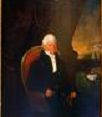

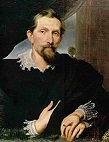


1629 The first of four mass migrations from distinct regions of Britain begins as 20K Puritans from the East Anglian counties E of London settle Massachusetts ("near the great hill") over the next dozen years (ends 1641) after Charles I issues a charter to the Mass. Bay Co.; well-to-do 40-y.-o. East Anglian lawyer John Winthrop (1588-1649) saying that "the eyes of all people are on us", decides to make the colony a "wilderness Zion", a "city upon a hill", where persecuted Puritans can find refuge and build the New Jerusalem (a little commercial activity, short of moneychanging in the Temple will be overlooked as well?), and soon discovers a loophole in the charter, a failure to require that the home office be kept in England; on Aug. 29 he gets 12 shareholders to sign the Cambridge Agreement, pledging to take the charter and hence the home office with them to Am., and the co.'s governing body agrees to it; Winthrop is chosen as first gov. of the planned Massachusetts Bay Colony, and ends up serving 12x. On Jan. 19 Shah Abbas I (b. 1571) dies after a 42-year reign which leaves the Safavid empire at its zenith, and is succeeded by his 13-y.-o. grandson Safi I (-1642), who becomes Safavid shah #6 (until 1642), who has the old shah's counselors beheaded along with most of the best generals, all the blood princes, and some of the princesses, causing the Persian gov. of Kandahar to defect the city and province to the Uzbeks. On Feb. 14 Mass. Bay Colony gov. John Winthrop writes to his wife: "Thou must be valentine, for none hath challenged me". On Feb. 24 the House of Commons passes some Resolutions on Religion, decrying popery in Scotland and Ireland; on Mar. 1 Charles I dissolves Parliament and rules the country himself; it doesn't meet again until Apr. 1640; the term "Tory" is coined for the pro-Charles party. On Mar. 6 HRE Ferdinand II issues the Edict of Restitution empowering the Roman Catholic Church to recover all property seized by Protestants since the 1552 Peace of Passau, pissing off some of Ferdinand's allies, esp. elector Johann Georg I of Saxony, who tries in vain to get his land grabs exempted. On May 22 the Peace of Lubeck (Lübeck) is signed, and Christian IV agrees not to intervene in imperial affairs anymore, leaving almost all German territories under control of the Catholic League; too bad, this pisses off Gustavus II Adolphus of Sweden, who starts to prepare to enter the lovely Thirty count 'em Thirty Years' War. On June 4 the Dutch merchant ship Batavia, commanded by Commodore Francisco Pelsaert (1591-1630) wrecks on Morning Reef in the Abrolhos Islands (Houtman Abrolhos) in W Australia (1 mi. S of Beacon Island), and 40 of 341 drown trying to reach shore; the capt. then sets off in the ship's boats his 30-man crew for help, leaving 208 passengers behind; co. undermerchant Jeronimus Cornelisz (1598-1629) takes over Lord of the Flies style, murdering 125 of them within 2 mo. while forcing the women into prostitution; luckily Wiebbe Hayes (b. 1608) manages to establish a safe base for some of them on a neighboring island, and they begin a war; on Sept. 17 Pelsaert returns in an Indonesian rescue ship and overcomes the mutineers and executes many of them; Dutch mutineers Wouter Loos and Jan Pelgrom de By are set adrift off the W coast of Australia at Shark Bay (AKA Hopeless Reach, Useless Inlet, Disappointment Loop) (known for the Wooramel Seagrass Bank and 12 species of sharks), becoming the continent's first white Euro settlers, mating with the Aborigines; in 1963 fisherman Dave Johnson discovers the wreck of the Batavia 45 mi. N of the Abrolhos, and it is salvaged in the 1970s. On June 28 the Huguenot revolt in France ends with the Peace of Alais (Ales) (Alès) (Edict of Grace), issued by Louis XIII, confirming the basic principles of the Edict of Nantes but revoking the Huguenots' basic political rights and demanding that they give up all their cities and fortresses in exchange for amnesty and tolerance; this no-ask-no-tell policy lasts until 1685. On Aug. 6 the First Church of Salem, Mass. is founded in a mud-and-thatch hut by a strict Puritan community of 150 English settlers who pooh-pooh popery (decorations, vestments, musical accompaniment); Sunday is defined as from sunset on Saturday to sunset on Sunday, and all travel is prohibited other than going to-from church; Sunday services last 2-3 hours, filled with Psalm chanting and firey sermons; later members incl. writer Nathaniel Hawthorne, Roger Williams (a minister there) and the Parker game family; in modern times it is taken over by Unitarians who worship alongside descendants of the "Salem witches"; meanwhile Mayflower man Isaac Allerton, husband (since 1626) of William Brewster's daughter Fear Brewster brings back pesky Thomas Morton, and the Puritans hear that he was "not so much rebuked", surprising them; they both become personae non grata, and Allerton eventually is ordered to leave Mass., ending up in New Amsterdam in 1643, then New Haven, Conn.; meanwhile there is a winter famine in Salem, causing them to seize the Merry Mount corn. On Sept. 14 Hertzogenbusch (Bois-le-Duc) Fortress in Brabant falls to the Protestants under Prince Friedrich Heinrich and Duke Bernhard of Saxe-Weimar. On Sept. 25/26 Sweden and Poland sign the 6-year Truce of Altmark (Stary Targ) near Danzig (Gdansk), ending the Polish-Swedish War (begun 1626), with Poland acknowledging the loss of Livonia. In Oct. Japanese shogun Tokugawa Iyemitsu declares that it is immoral for women to dance in public, and orders Kabuki Theater to become all-male, with women's roles performed by men in drag; the Japanese go to great lengths to make them appear feminine; meanwhile on Dec. 22 the Purple Clothes Incident sees Japanese emperor (since 1611) Go-Mizunoo (b. 1596) screw up and bestow honorific you know whats to 10+ priests despite the shogun's edict banning them for two years in order to break their longstanding bond, causing the shogun to intervene, cancel the deal, and force him to abdicate in favor of his 5-y.-o. 2nd daughter Meisho (1624-96) (personal name Okiko) (daughter of Kazuko, daughter of shogun Tokugawa Hidetada) (the name Meisho is a combo of previous female emperors Gemmei (707-15) and Gensho (715-24)), who becomes the 7th woman to ascend the Chrysanthemum Throne (last Empress Shotoku, d. 770), becoming Japanese emperor #109 (until Nov. 14, 1643). In Dec. James Butler (b. 1610), heir of the Old English Butler family in Ireland marries Lady Elizabeth Preston, heiress of the Old English Desmond family in Ireland, ending their long feud. An English fleet seizes Quebec, causing Etienne Brule to flee to Huron country, where he is murdered in 1633. Wallenstein becomes duke of Mecklenburg. Under the urging of Amsterdam diamond and pearl merchant Kiliaen (Killian) Van Rensselaer (1585-1643), Dutch colonizers called patroons are authorized to establish large estates in New Netherland which they can rule with full feudal jurisdiction limited only by an oath of fealty to the Dutch West India Co.; they are required to purchase Indian rights to their land and settle at least 50 colonists on it within four (five?) years. After failing at his Avalon colony in Newfoundland, Sir George Calvert arrives in Va., and after finding that Roman Catholics are not welcome goes to England to try to get a charter for land to the S, causing the Puritans to send William Claiborne after him to argue their case that there's no room for anymore My Name is George troublemakers on their continent? The royal gov. of Va. allows annual assemblies of the people. William Bradford and others receive a land grant on the Kennebec River; the Plymouth Colony establishes a trading post on the site of future Ft. Western. Saugus, Mass. (Algonquin "great/extended") in NE Mass. is founded as a territory, which later incl. the towns of Lynn, Nahant, Reading, Swampscott, and Wakefield. John Mason and Sir Ferdinando Gorges are granted a tract of land around Lake Champlain extending N to the St. Lawrence River which they call Laconia. Red-bearded Muslim corsair Barbarossa Hayreddin Pasha (1478-1576) (known for a flag with symbols of Islam, Christianity, and Judaism) captures Algiers and makes it his pirate stronghold. Mexico City is flooded, and remains underwater until 1633. A mission and church are built by two Spanish padres in San Antonio, Tex.; the mission is destroyed by Apaches in 1675. The inland seaport of Barranquilla in Colombia is founded (modern pop. 1M). The Hanseatic League entrusts the guardianship of the common welfare to Lubeck, Hamburg, and Bremen as it slides into the toilet by 1669. A royal charter is granted to the Worshipful Co. of Spectacle Makers in London. The first coffeehouses open in Venice, Italy (1645?). After find that aristocratic women can't work as nurses because their hubbies don't want them coming home dirty and vermin-infested, the Assoc. of the Ladies of Charity is founded in Paris by St. Vincent de Paul and Louise le Gras, recruiting poor girls as nurses, who are given instruction and work in special uniforms without having to become nuns. Sir John Eliot (1604-90), who was in again and out again from prison in 1627-8 presents a series of resolutions in the House of Commons against arbitrary taxation and religious innovations, getting him imprisoned again; this time the king demands his submission as a condition of release, and he steadfastly refuses until he dies in priz in 1632. Gianlorenzo Bernini takes over direction of the uncompleted work at St. Peter's in Rome; he builds the canopy over the papal altar and the bell towers, and decorates the naves. Peter Paul Rubens is appointed as Dutch envoy to Charles I of England to work for peace, and is knighted by him - cause every fat girl's crazy about a sharp-dressed man? Diego Velazquez travels to Venice, Rome, and Naples for two years to round himself out. Extra, extra, read all about it? Flemish Jesuit Heribert Rosweyde (b. 1569) dies, and his collection of materials on the lives of the Catholic saints is taken over by Jesuit Jean de Bolland (1596-1665) in Antwerp, who edits vols. 1-5; after his death the Bollandists are founded to continue the job, moving to Coudenberg Monastery in Brussels in 1773, then the Tongerloo Abbey in 1789, until the French Rev. closes the abbey in May, 1794; in 1837 a new assoc. is formed by the Belgian govt., producing vol. 54 in 1845, then a new 61-vol. ed. in 1863-7, followed by supplements in the periodical Analecta Bollandia starting in 1882 - the lines are long in Disneyland? Architecture: Shah Jahan orders the construction of the Peacock Throne. Nonfiction: Anon., The Paris Polyglot Bible (1629-45); sponsored by French atty. Guy Michel le Jay; inspired by the Antwerp Polyglot Bible of 1568 with Arabic added. Lancelot Andrewes (1555-1626), XCVI Sermons - the 17th cent. 96 Tears? Cyril Lucaris (1572-1638), Confession; his Calvinist-inspired reformist beliefs from Geneva cause the Greek Orthodox Church to close ranks against him. John Parkinson (1567-1650), Paradisi in Sole Paradisus Terrestris; on flowers. Music: The operetta La Zarzuela is first performed in its namesake, the royal palace near Madrid. John Milton (1608-74), Four Literary Hymns (Nativity, Passion, Circumcision of Christ, At a Solemn Music). Heinrich Schutz (1585-1672), Sinfoniae Sacrae. Art: Anthony van Dyck (1599-1641), Rinaldo and Armida. Daniel Mytens the Elder (1590-1648), Portrait of James Hamilton, 1st Duke of Hamilton (1606-49). Rembrandt van Rijn (1606-69), Self-Portrait as a Young Man; Self-Portrait in a Gorget. Peter Paul Rubens (1577-1640), Peace and War; Charles I and His Queen. Frans Snyders (1579-1657), Concert of Birds (1629-30). Diego Velazquez (1599-1660), The Feast of Bacchus (Los Borrachos). Francisco de Zurbaran (1598-1664), St. Bonaventura. Plays: Pedro Calderon de la Barca (1600-81), The Phantom Lady (La Dama Duende) (comedy). Pierre Corneille (1606-84), Melite (comedy) (Paris) (debut). Sir William Davenant (1606-68), The Just Italian (comedy). John Ford (1586-1640), The Lover's Melancholy. Ben Jonson (1572-1637), The New Inn. Philip Massinger (1583-1640), The Picture (tragicomedy). Thomas Middleton (1580-1627), Inner Temple Masque; refers to rival Ben Jonson as a "silenced bricklayer". Poetry: John Milton (1608-74), On the Morning of Christ's Nativity (Dec.); becomes a tradition to read it at Christmastide. Births: Dutch Baroque painter Gabriel Metsu (d. 1667) in Jan. in Leiden; son of Jacques Metsu (1588-1629). Russian Romanov tsar #2 (1645-76) Alexis (Aleksey) I Mikhailovich Romanov (d. 1676) on Mar. 9 in Moscow; son of Michael I Romanov (1596-1645); father of Feodor III (1661-82). Spanish gen. and PM (1677-9) Don John Joseph (Juan Jose) of Austria the Younger (d. 1679) on Apr. 7; illegitimate son of Philip IV and actress Maria Calderon; given a princely education by his daddy. Dutch physicist-mathematician-astronomer Christiaan (Christian) Huygens (Huyghens) (d. 1695) on Apr. 14 in The Hague; son of poet Constantijn Huygens (1596-1687) (friend of Rene Descartes); educated at the U. of Leiden. Polish king (1674-96) Jan III Sobieski (d. 1696) on Aug. 17 in Olesko; son of Jacob Sobieski of Cracow. English mathematician-astronomer Richard Towneley (d. 1707) on Oct. 10 in Nocton (near Lincoln), Lincolnshire; collaborator of Francois Walther de Sluze (1622-85). German duke of Brunswick-Luneburg and elector #1 of Hanover (1692-8) Ernest Augustus (d. 1698) on Nov. 20 in Herzberg am Harz; son of duke George of Brunswick-Luneburg (1582-1641) and Anne Eleonore of Hesse-Darmstadt (1601-59); George I of England (1660-1727). Dutch painter Pieter de Hooch (Hoogh) (Hooghe) (d. 1684) on Dec. 20 in Rotterdam; works for five years in Vermeer's Delft in the 1650s. French noble (gov. of Languedoc) Louis Armand I de Bourbon, Prince de Conti (d. 1666); 2nd son of Prince Henry II of Conde (1588-1646); brother of Louis II de Bourbon, prince of Conde and Anne Genevieve, duchess of Longueville (1619-79); husband (1657-) of Anne-Marie Martiniozzi (1638-72), niece of Cardinal Mazarin; becomes a Jansenist along with his sister. Dutch painter Jan Wouwerman (d. 1666); brother of Philips Wouwerman (1619-68) and Pieter Wouwerman (1623-82). English buccaneer Daniel Johnson (d. 1675) in Bristol; captured in 1654 by the Spaniards and sold as a slave in the West Indies, escaping in 1657 and becoming a you know what. English composer Matthew Locke (d. 1677) in Exeter. English soldier-statesman-ambassador Charles Howard, 1st Earl of Carlisle (d. 1685); great-grandson of Lord William Howard (1563-1640), 3rd son of Thomas Howard, 4th duke of Norfolk (1536-72); created earl of Carlisle in 1661. Deaths: Italian-Swiss Baroque architect Carlo Maderna (b. 1556) on Jan. 30. Am. Virginia Colony Gov. Edwin Sandys (b. 1561). German Hebrew scholar Johannes Buxtorf (b. 1564) on Sept. 13 in Basel, Switzerland. Flemish Jesuit hagiographer Heribert Rosweyde (b. 1569) in Antwerp. Persian Safawid (Safavid) ruler (1587-1629) Shah Abbas I (b. 1571) on Jan. 19. French statesman-cardinal Pierre de Berulle (b. 1575) on Oct. 2. Transylvanian prince Bethlen Gabor (Gabriel Bethlen) (b. 1580) on Nov. 15 in Gyulafehervar (modern-day Alba Iulia, Romania); dies after marrying a sister-in-law of Gustav II Adolf of Sweden to get his backing in obtaining the Polish crown. Danish physician-scientist Caspar Bartholin the Elder (b. 1585) on July 13 in Soro, Zealand. Dutch hero Jan Coen (b. 1587) on Sept. 21 in Batavia, Java; dies during a siege by Sultan Agung of Mataram. Italian composer Paolo Agostini (b. 1593). Dutch Reformed theologian Sixtinus Amama (b. 1593) on Nov. 9 in Franeker.